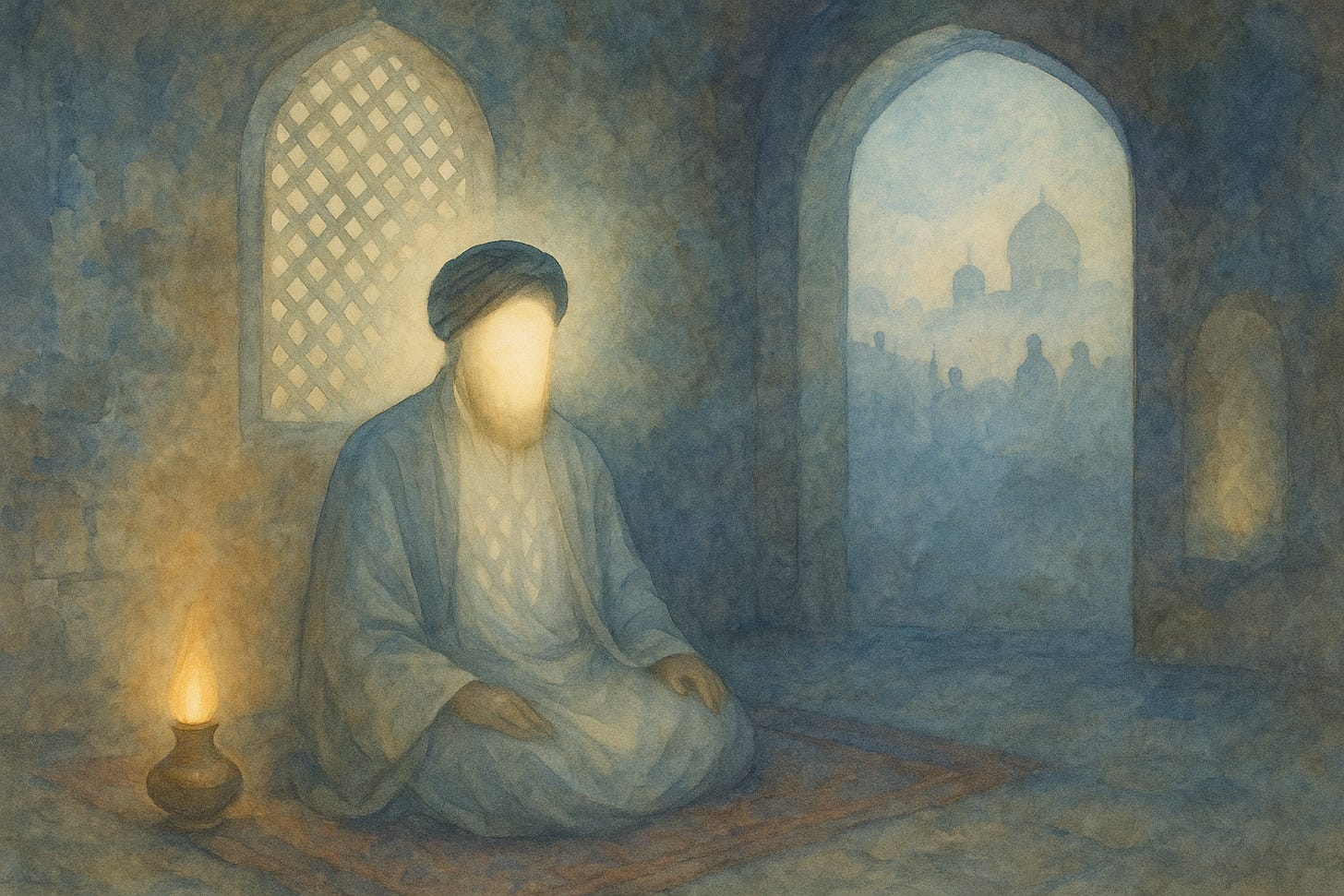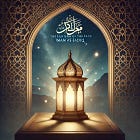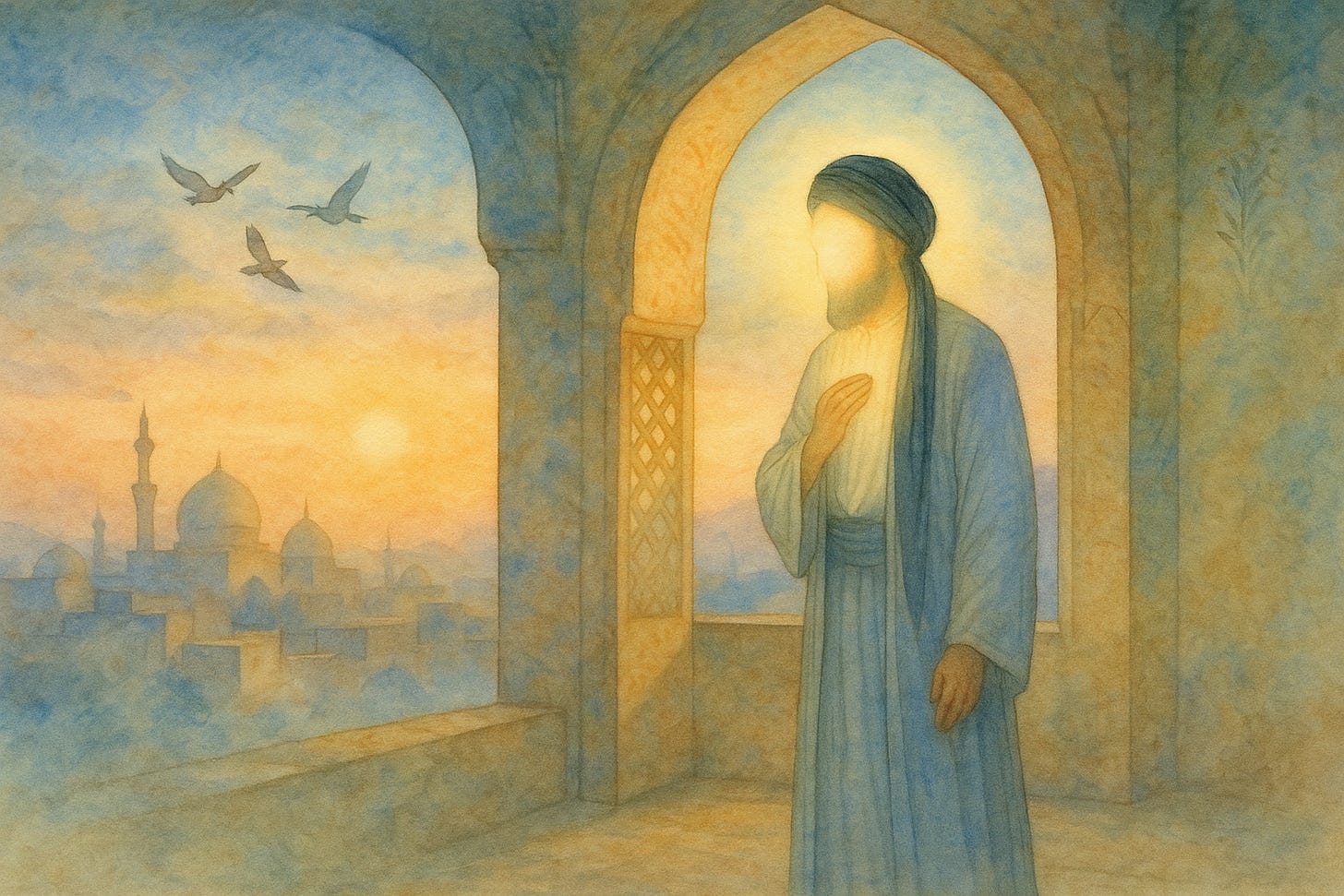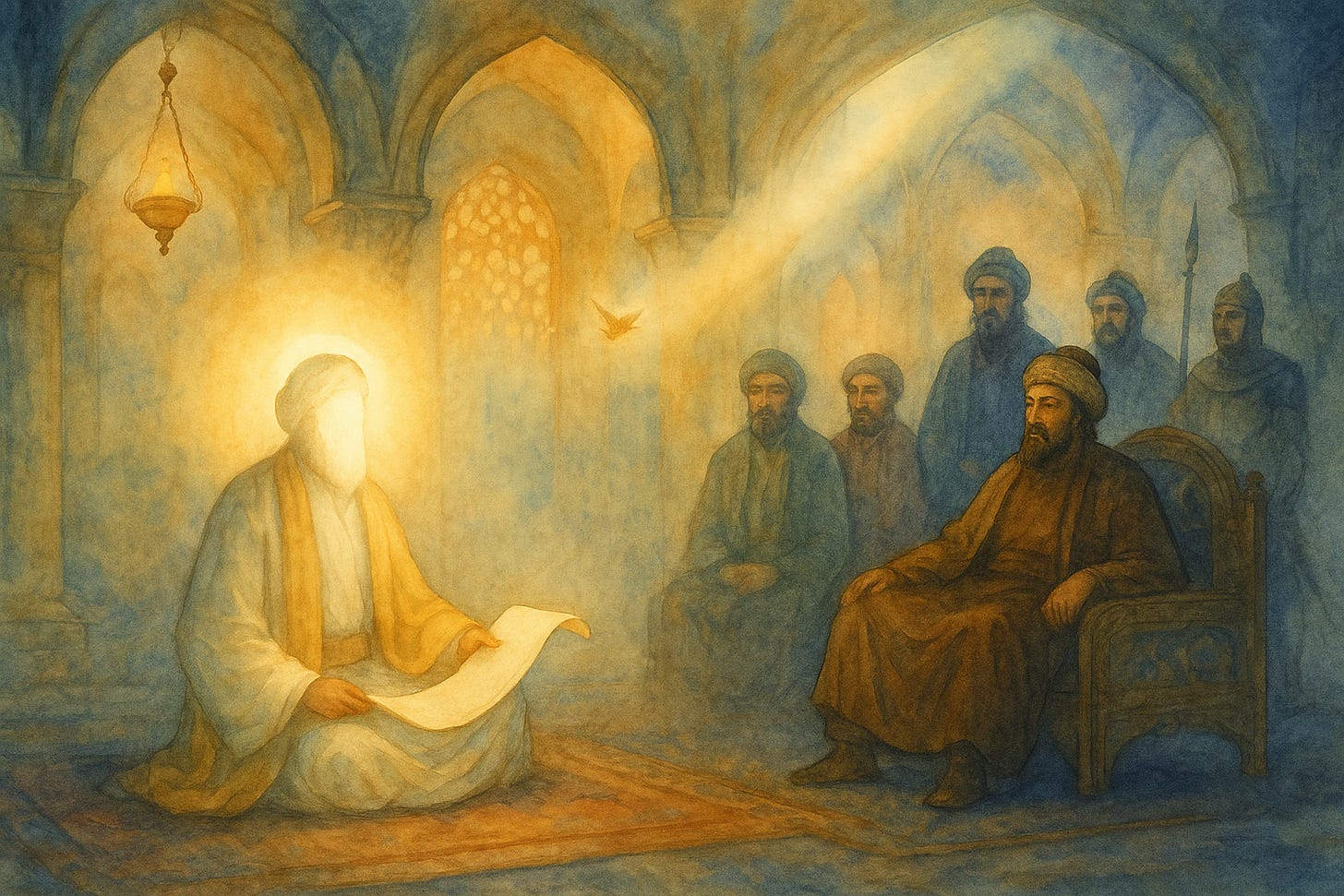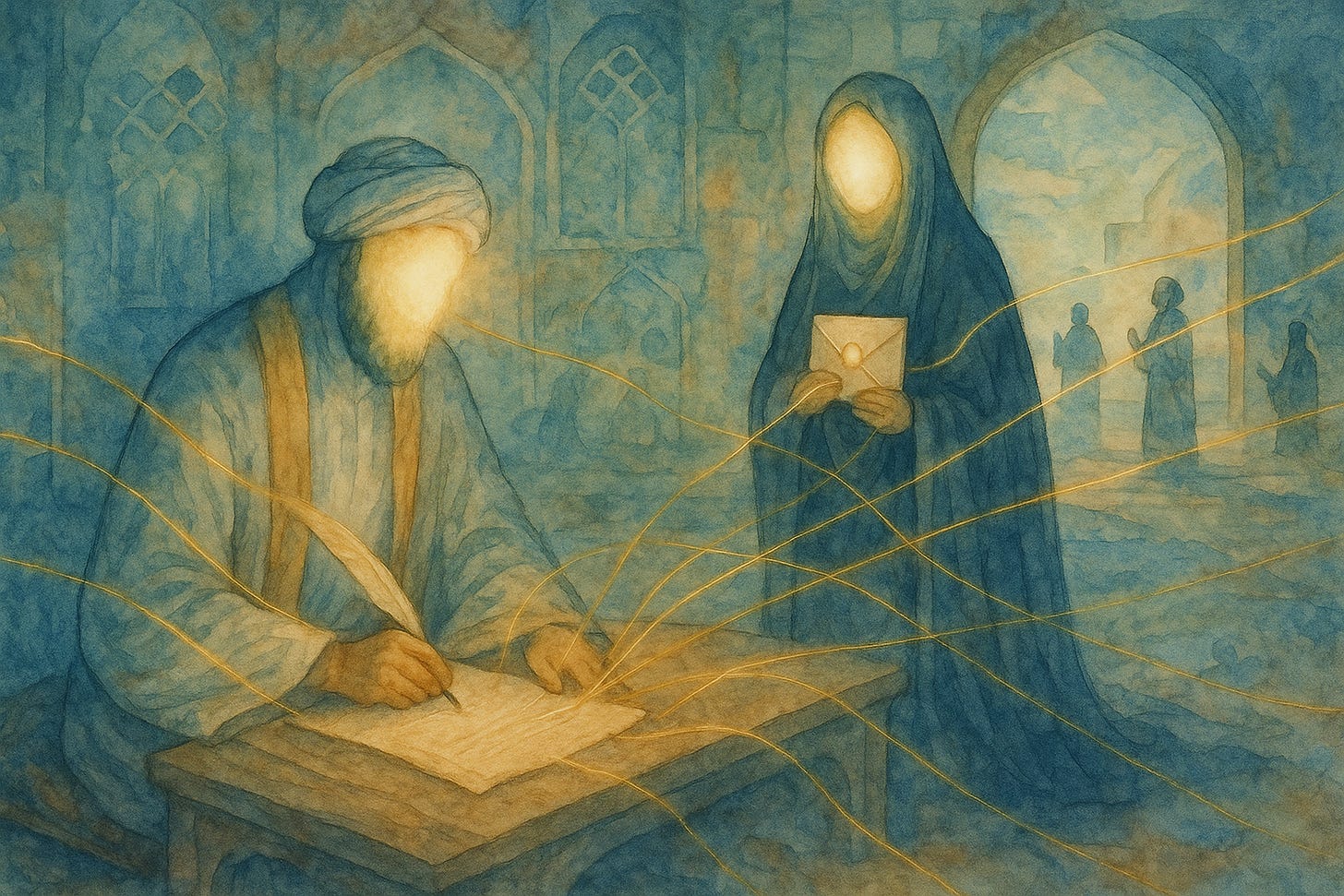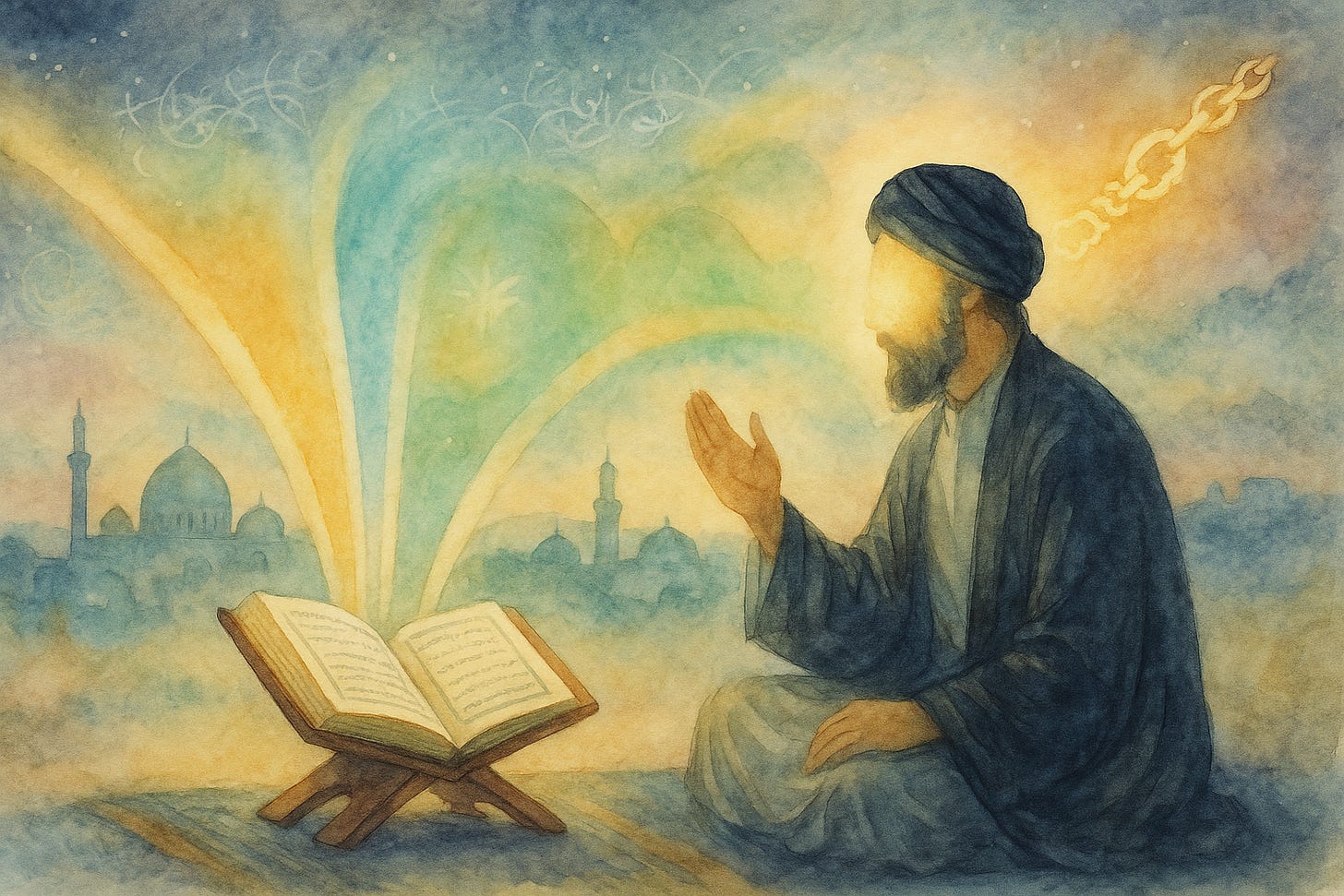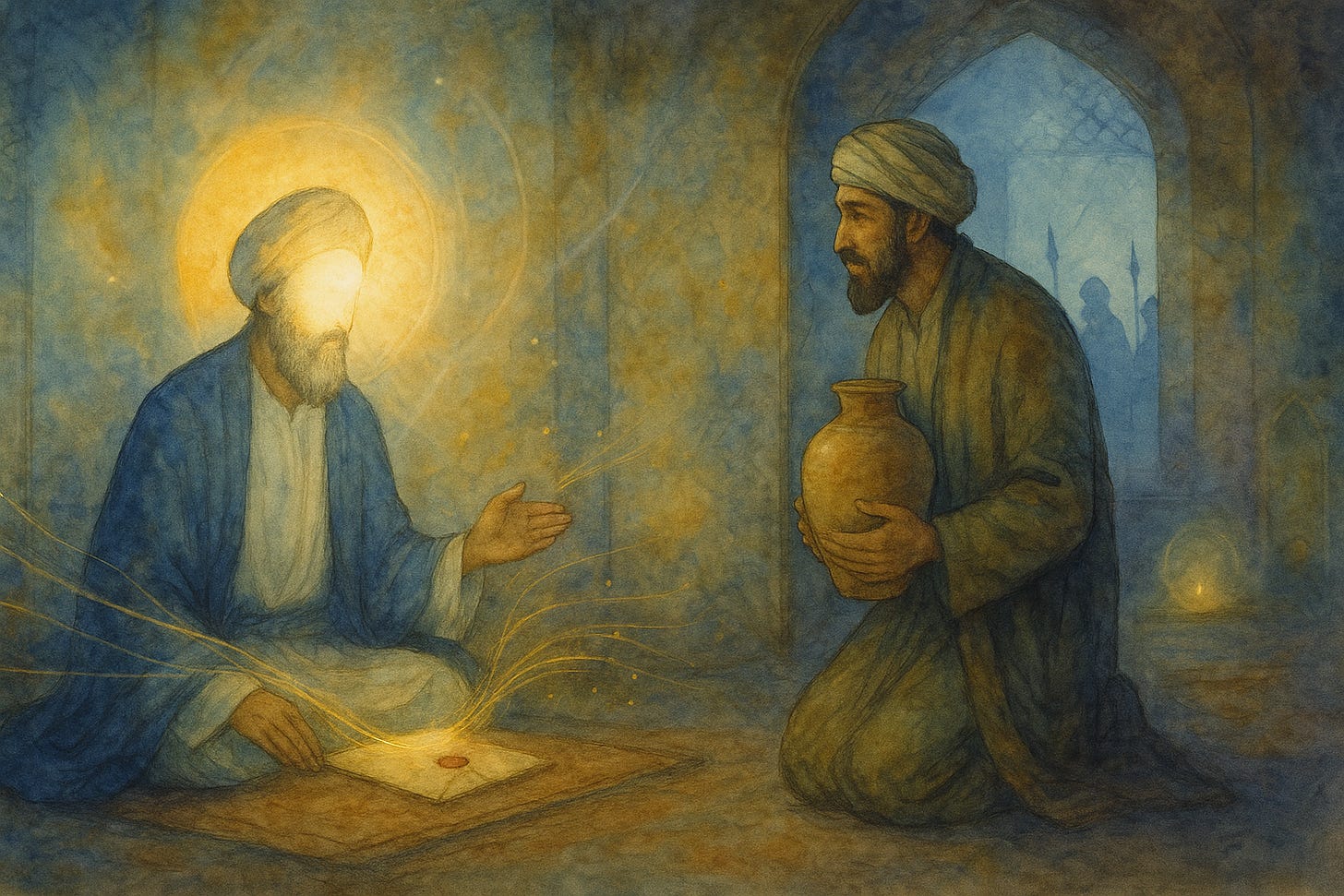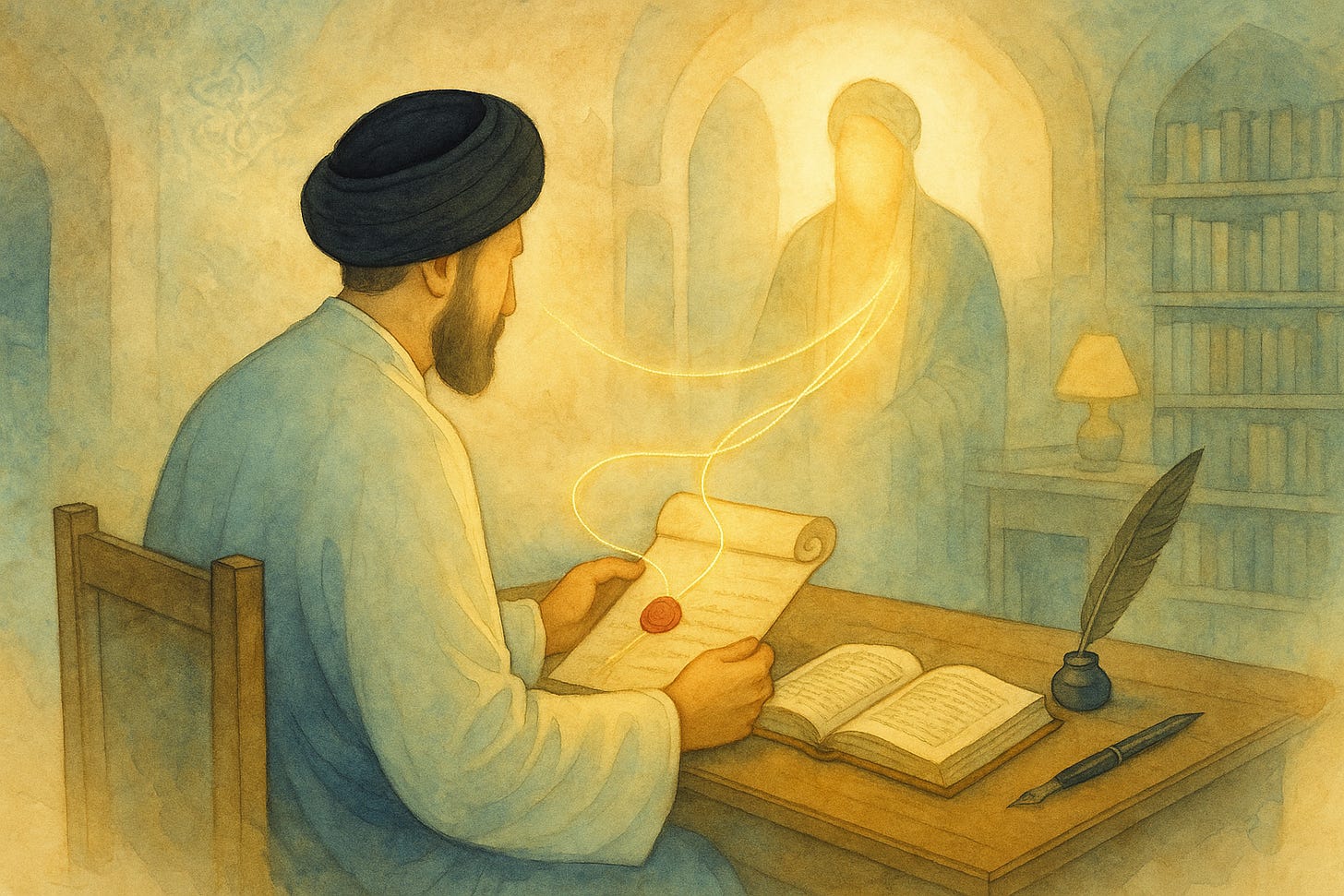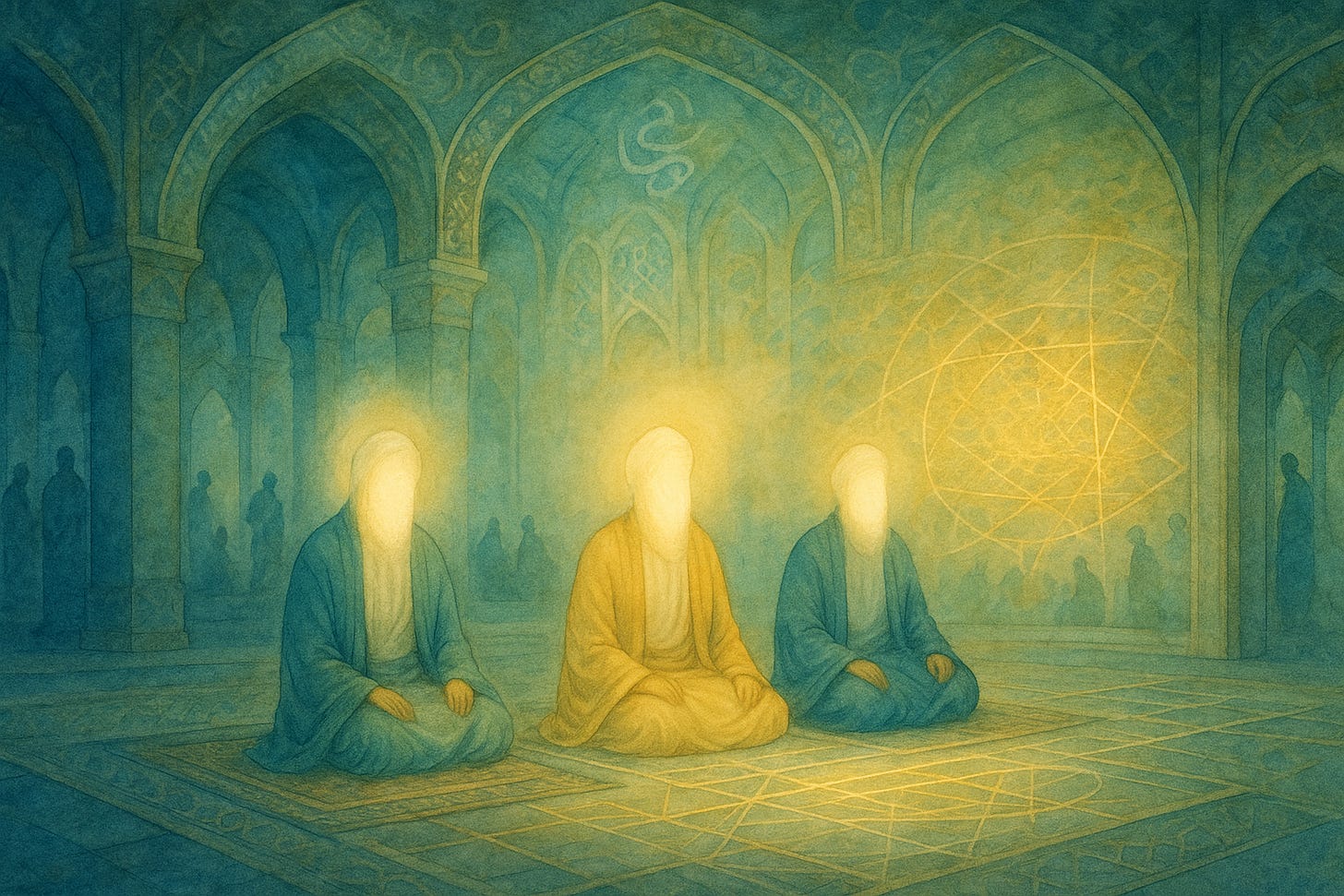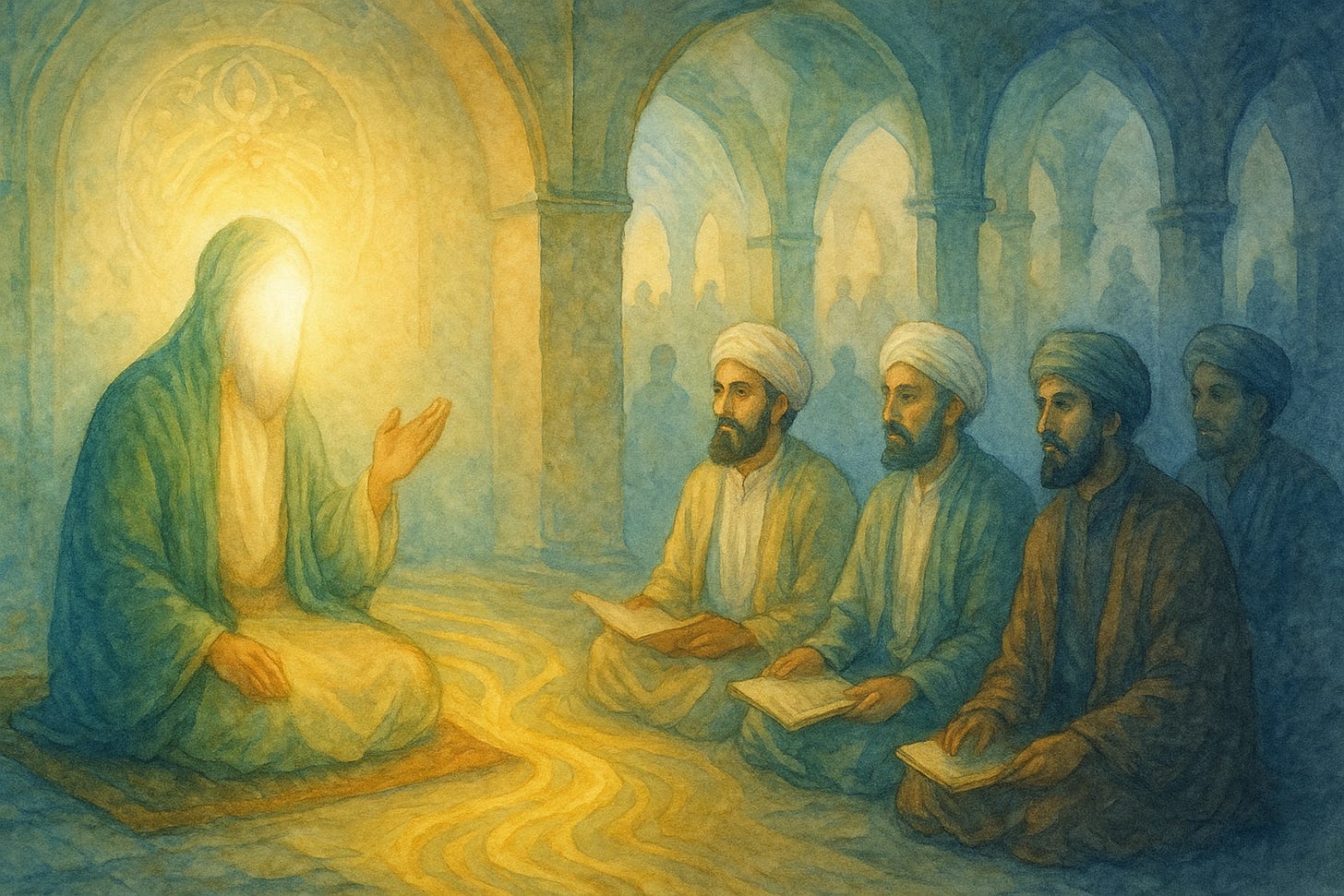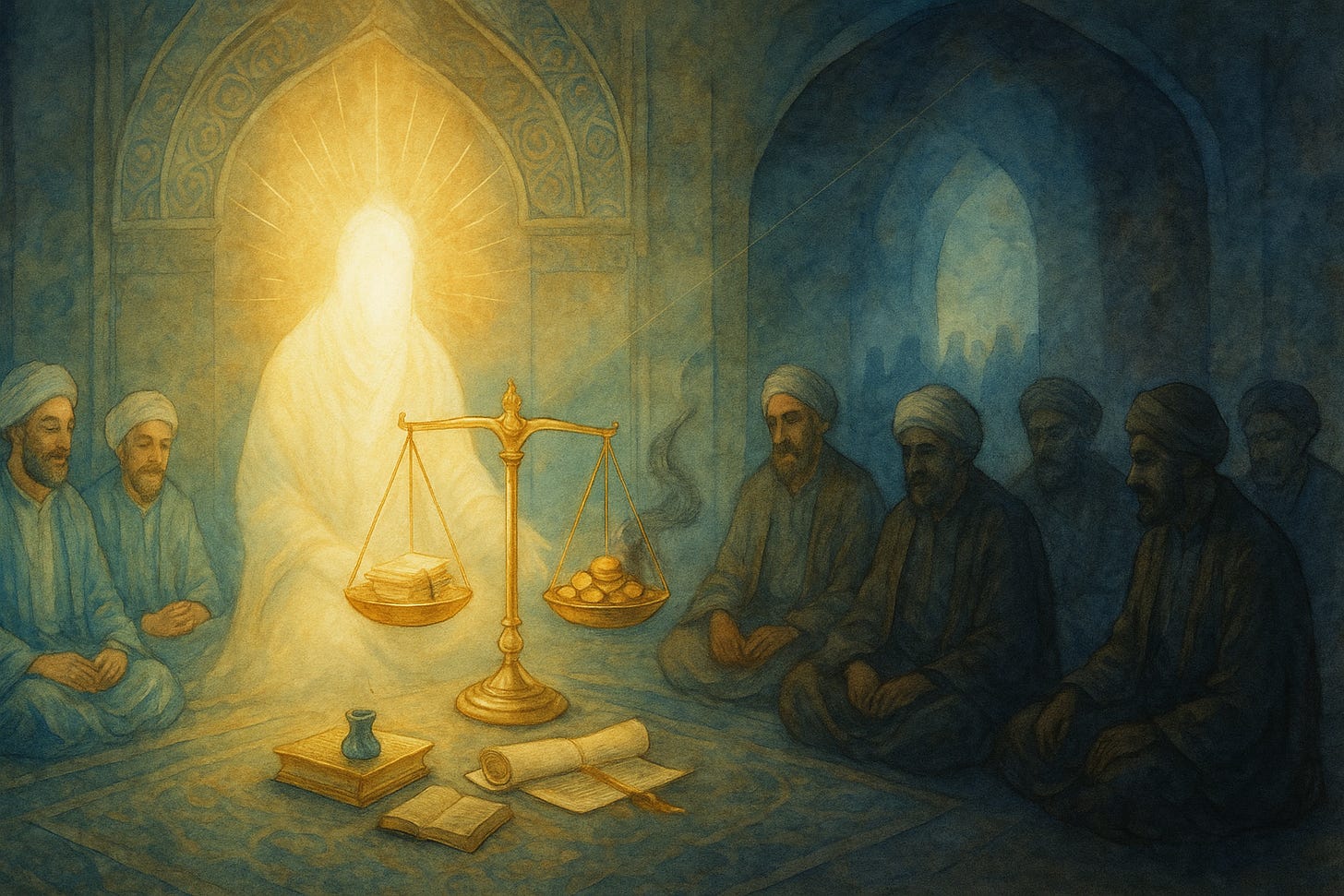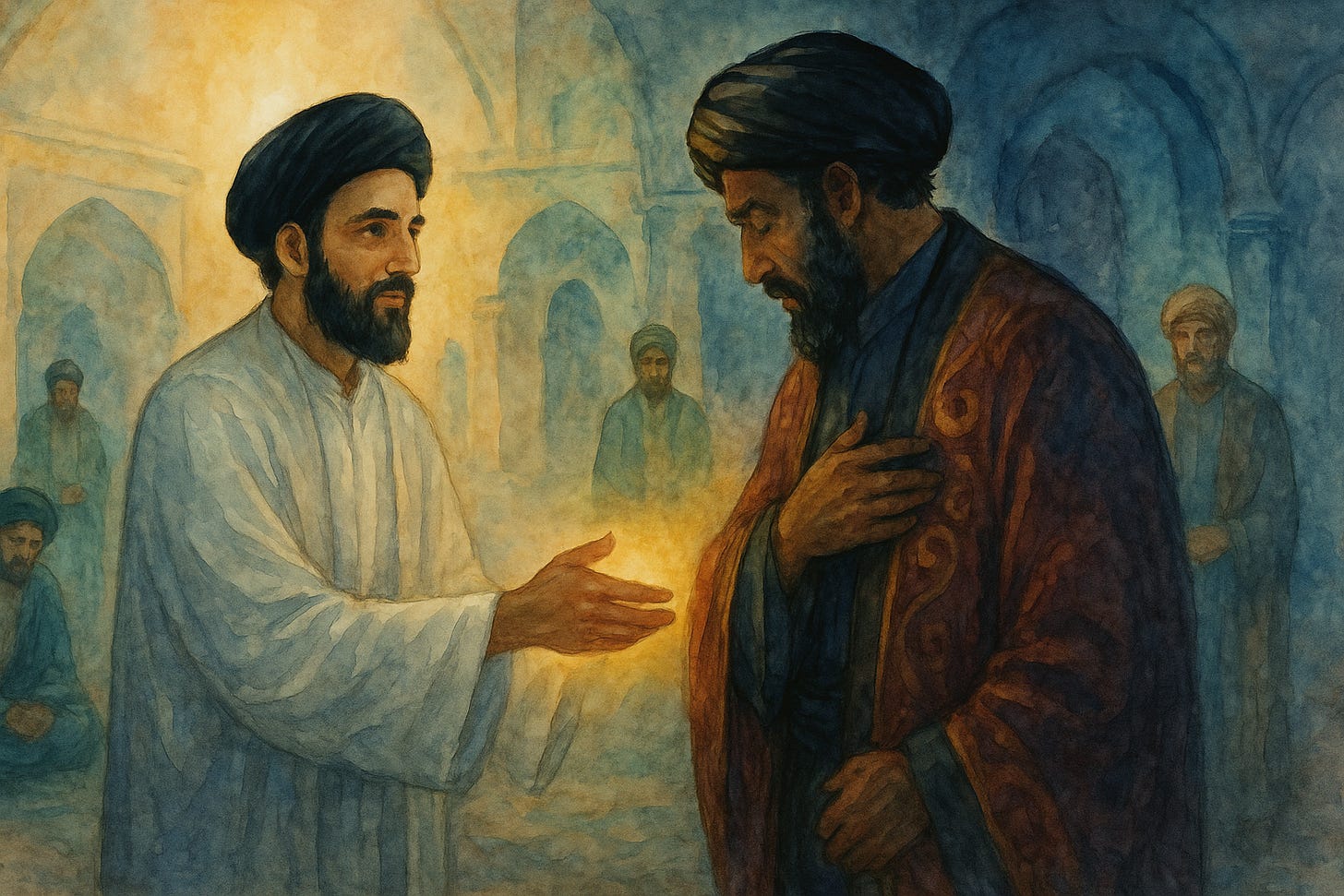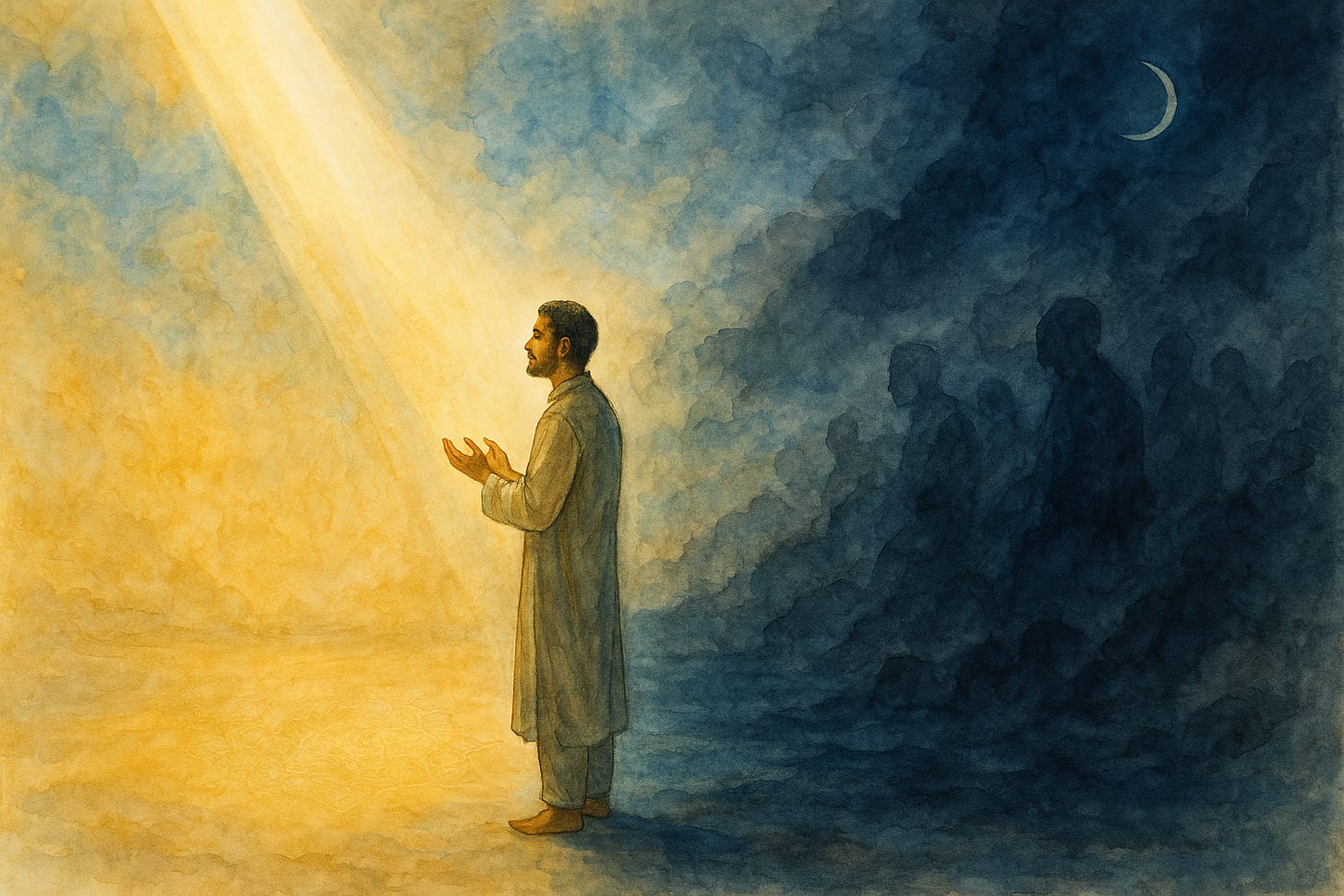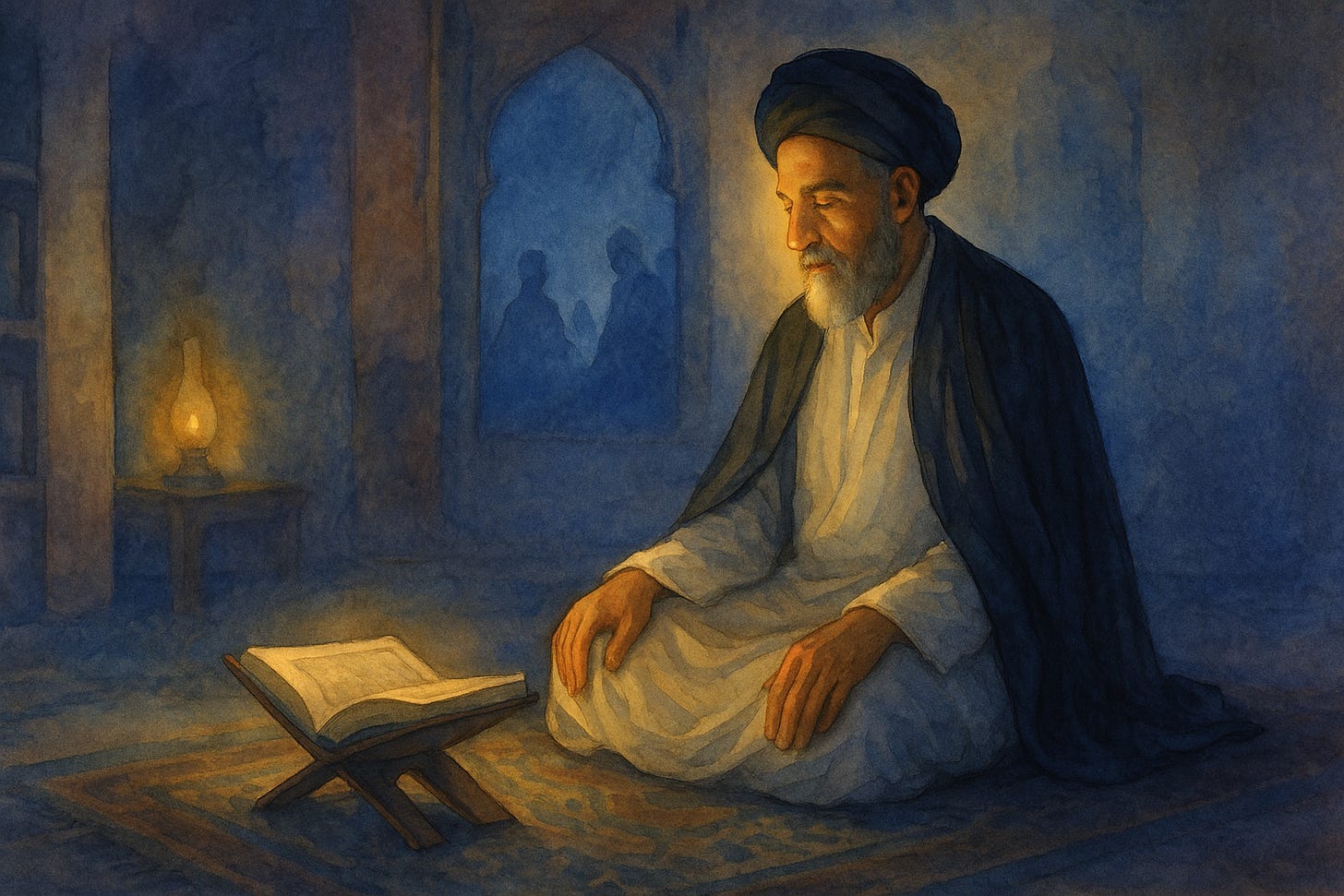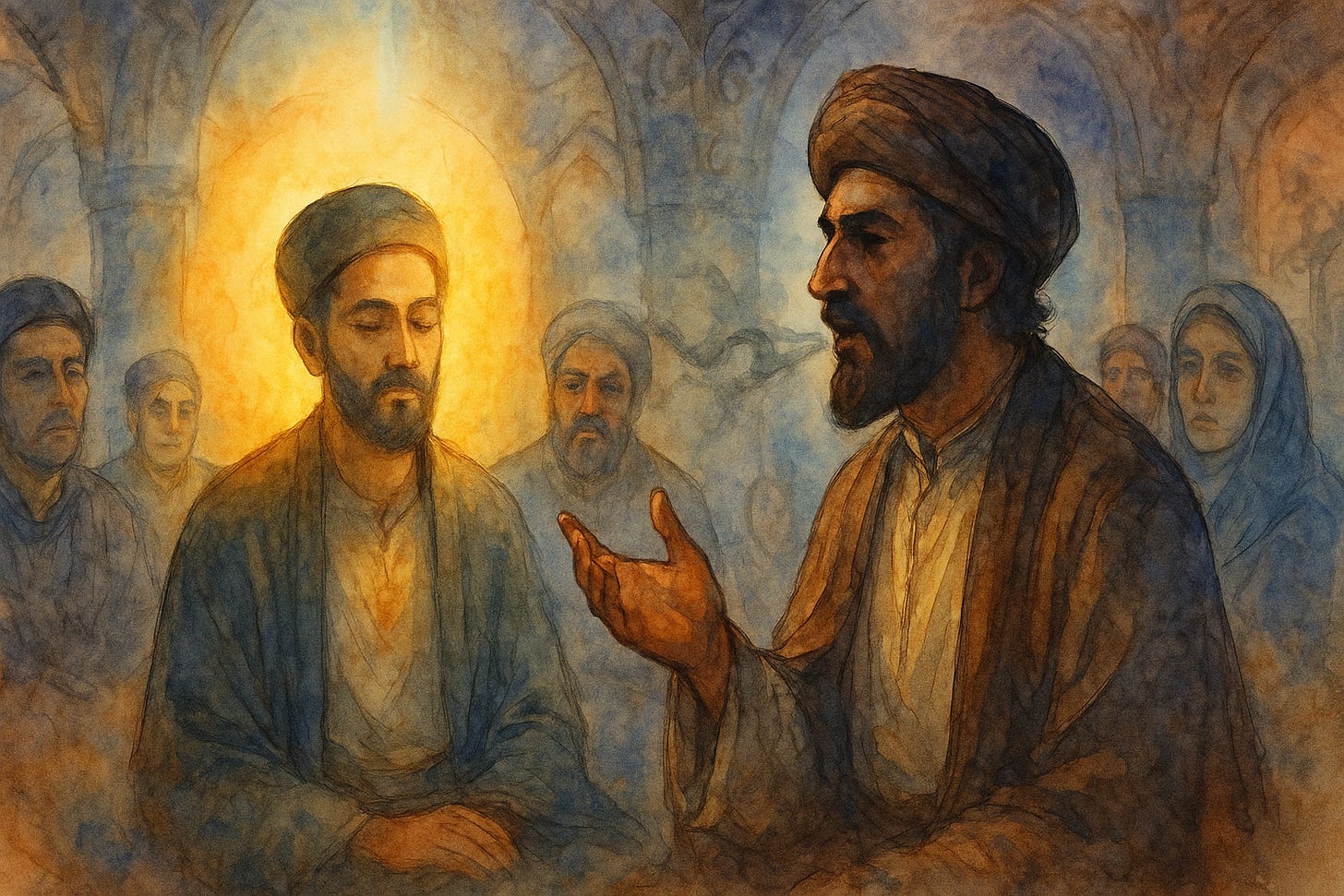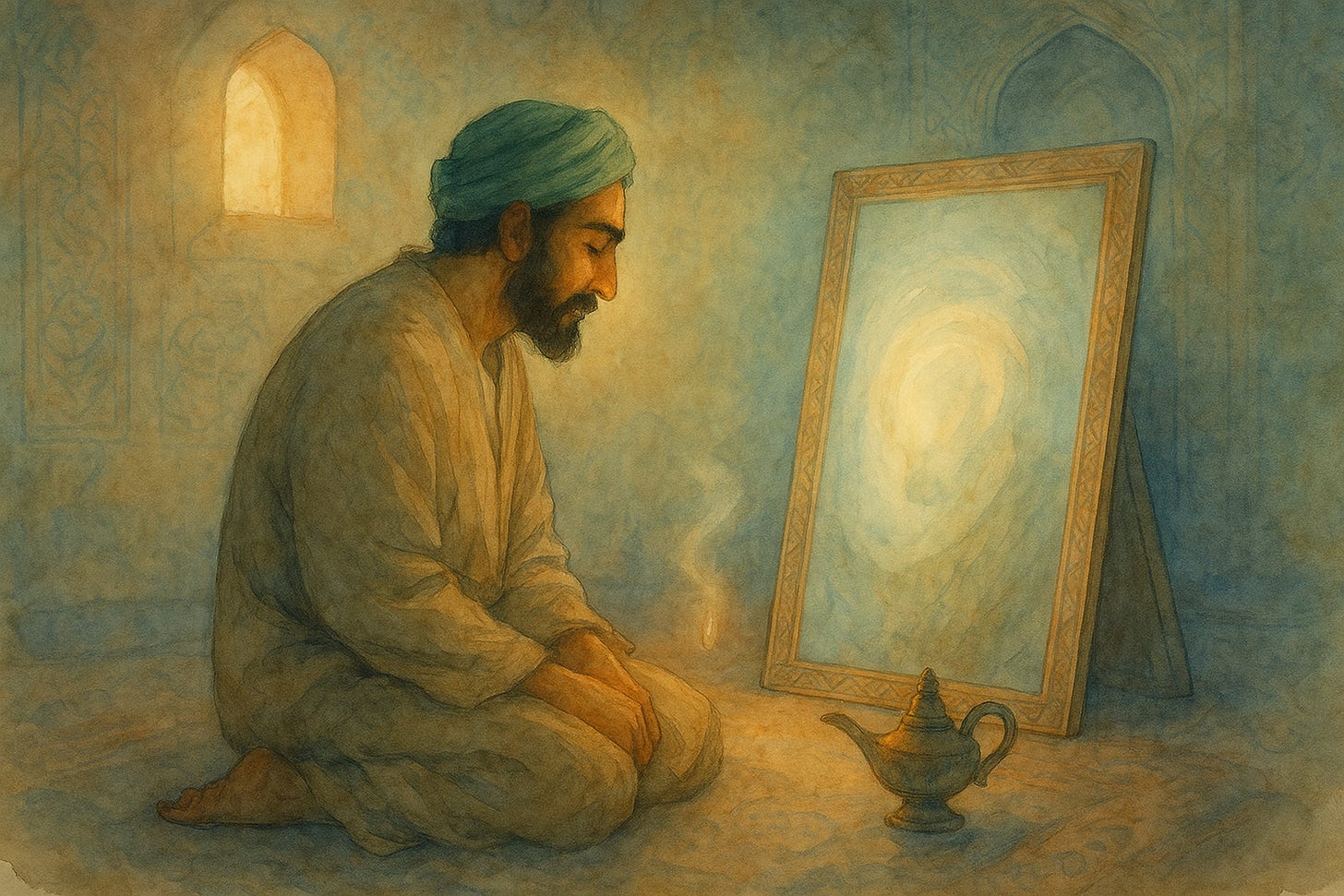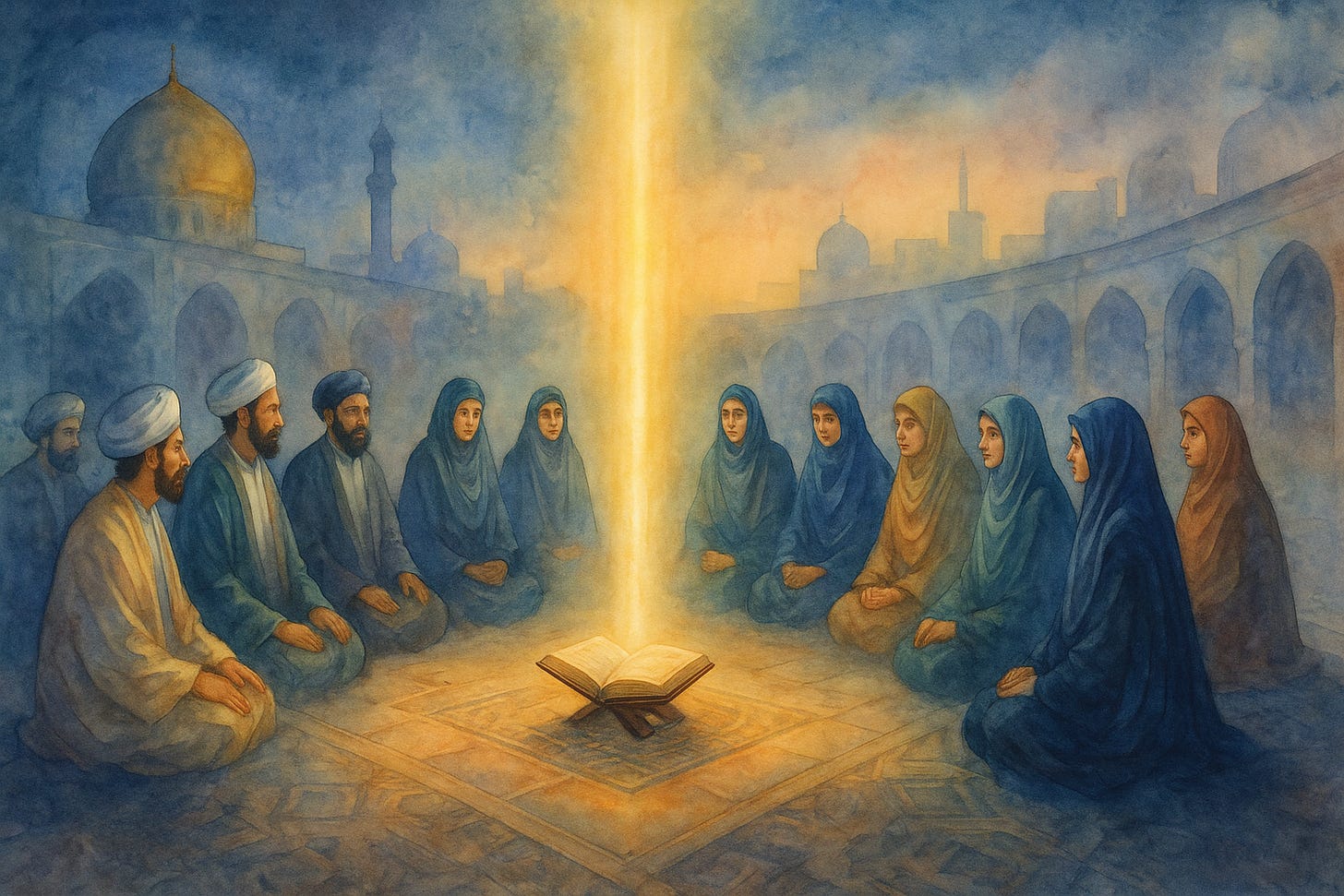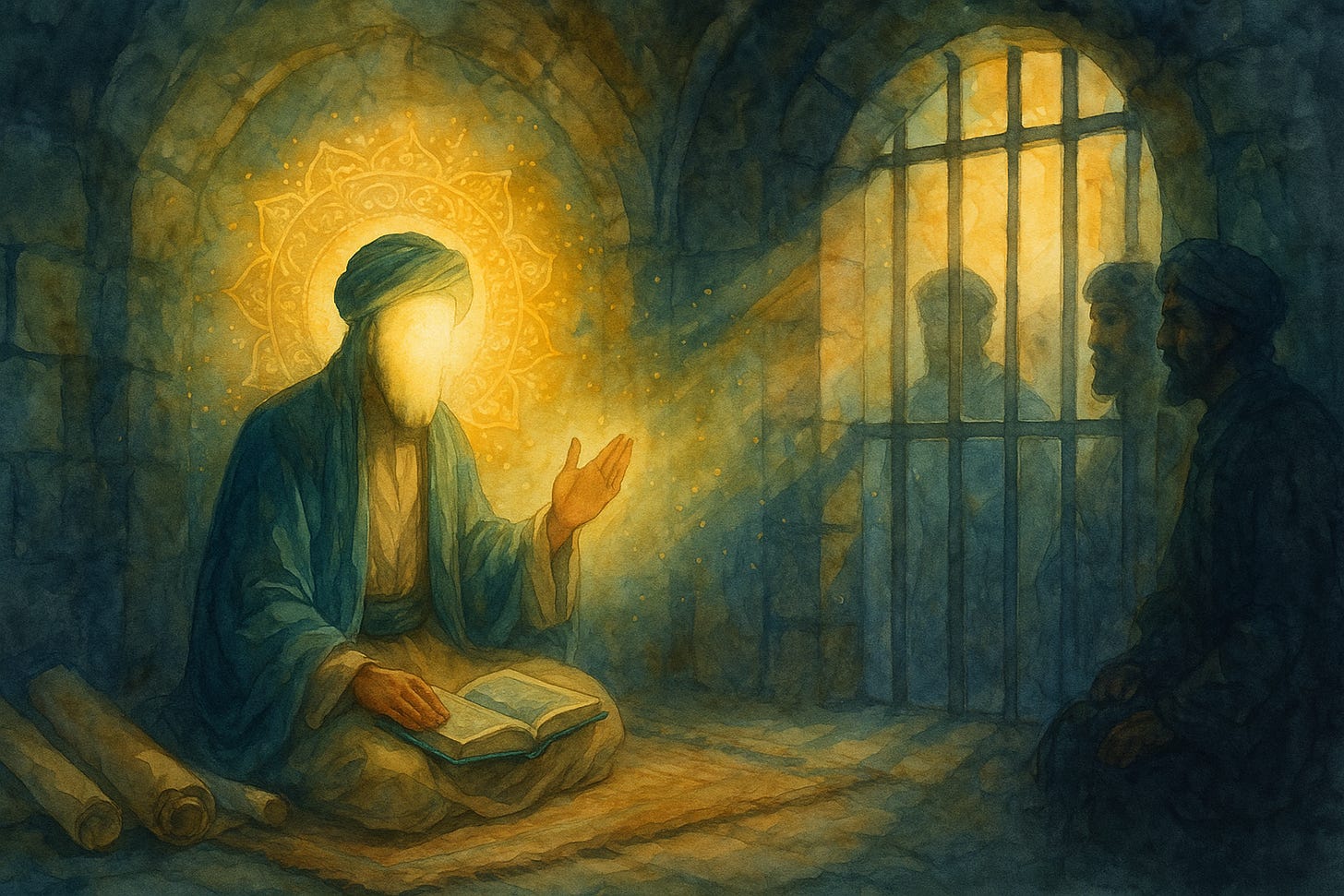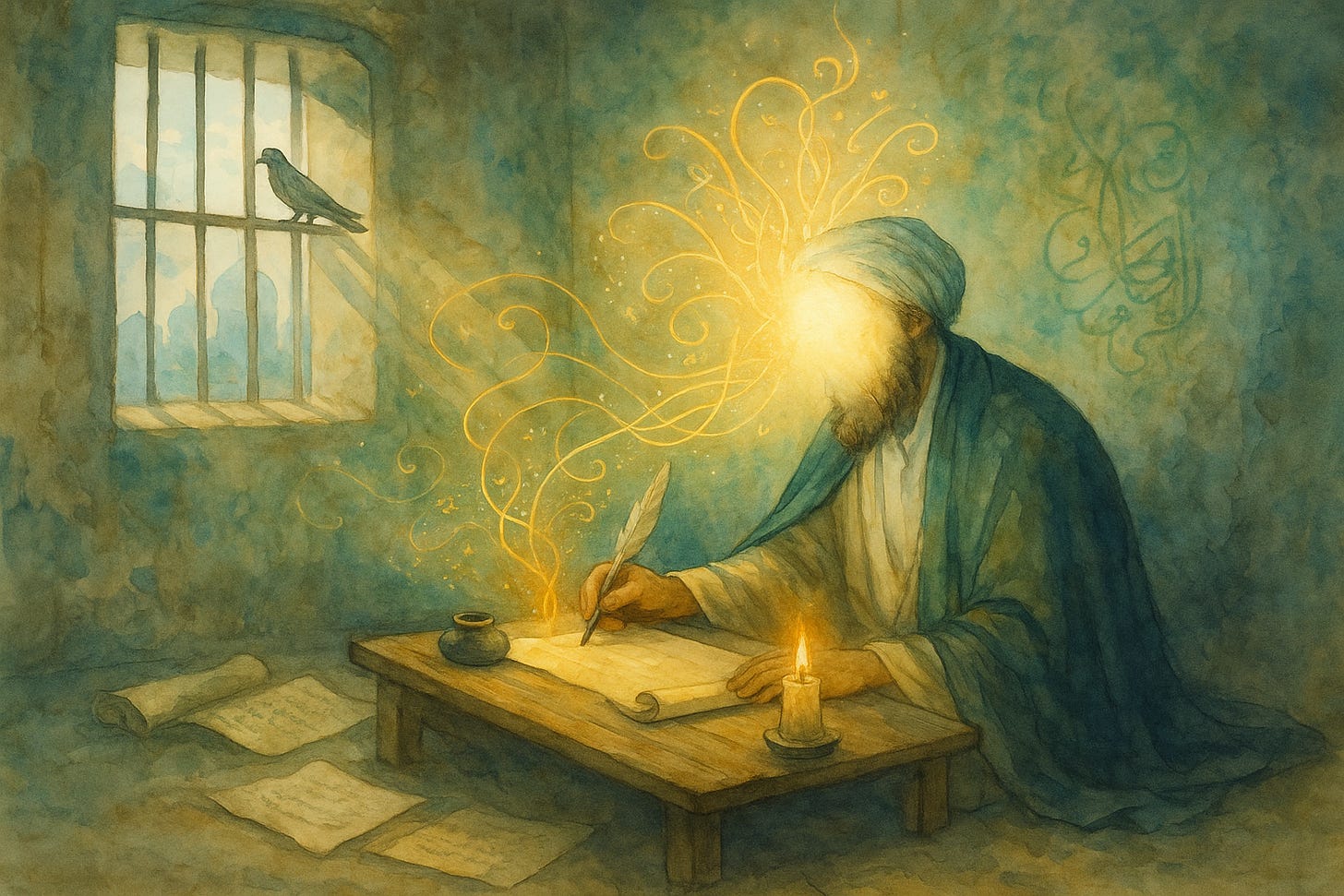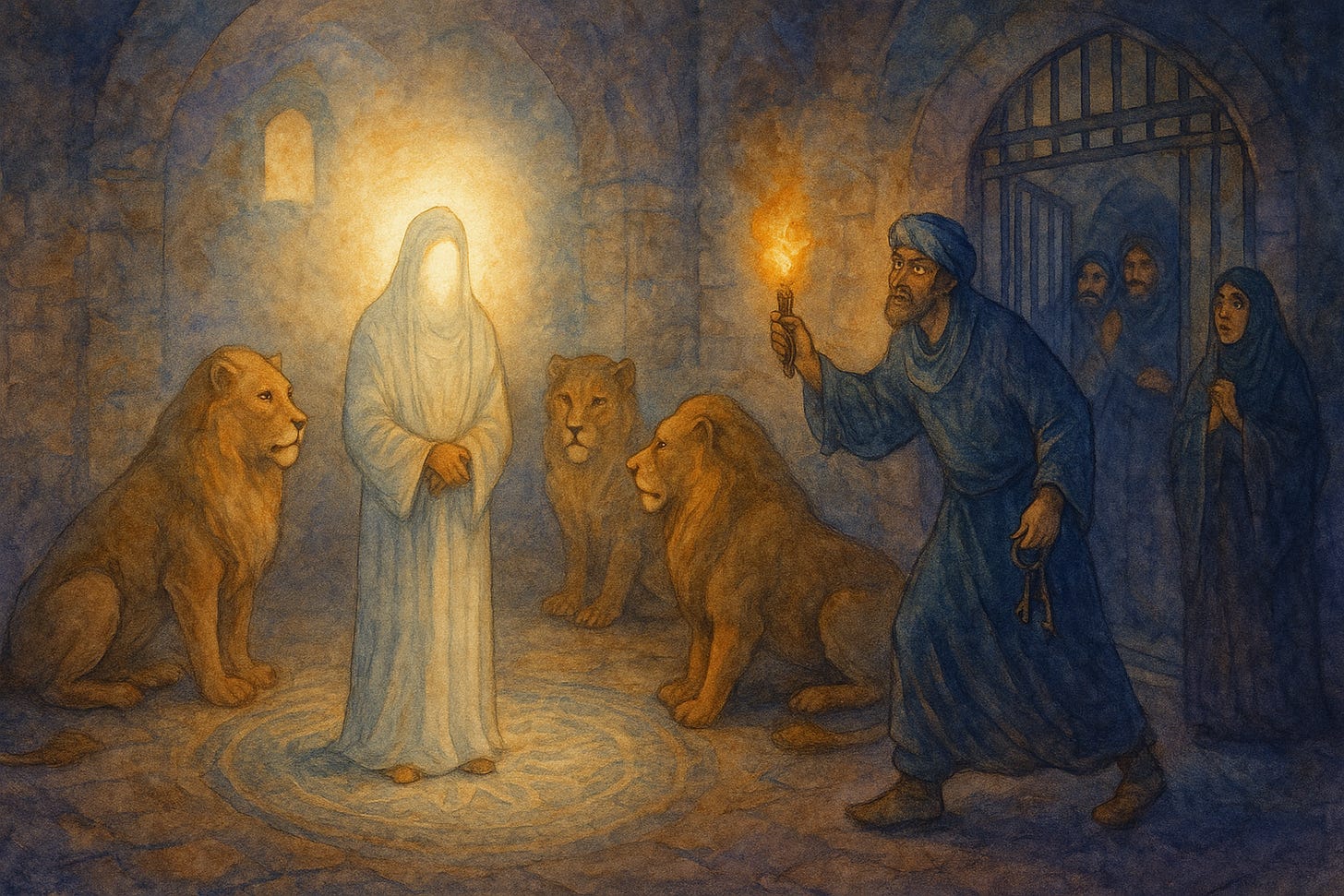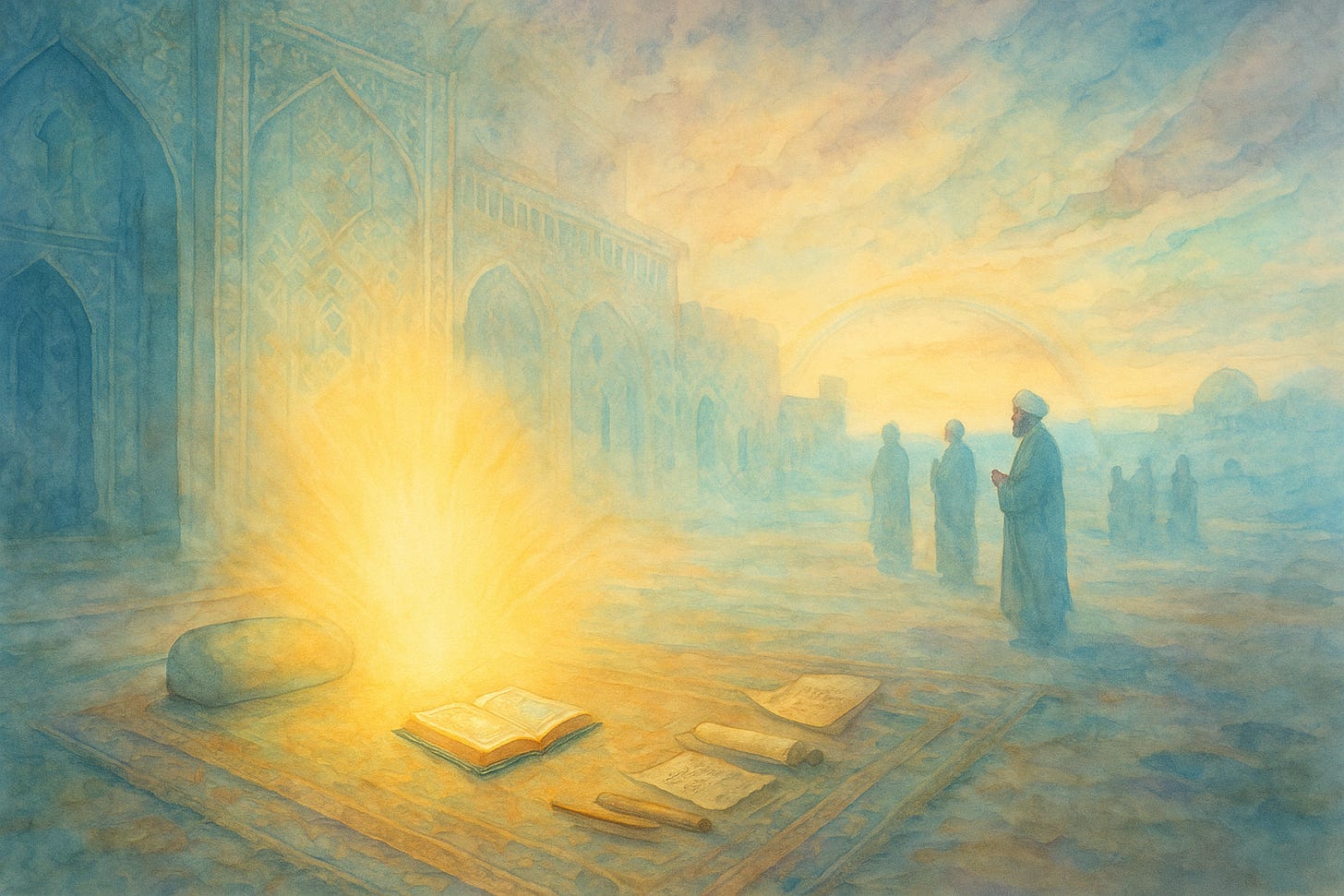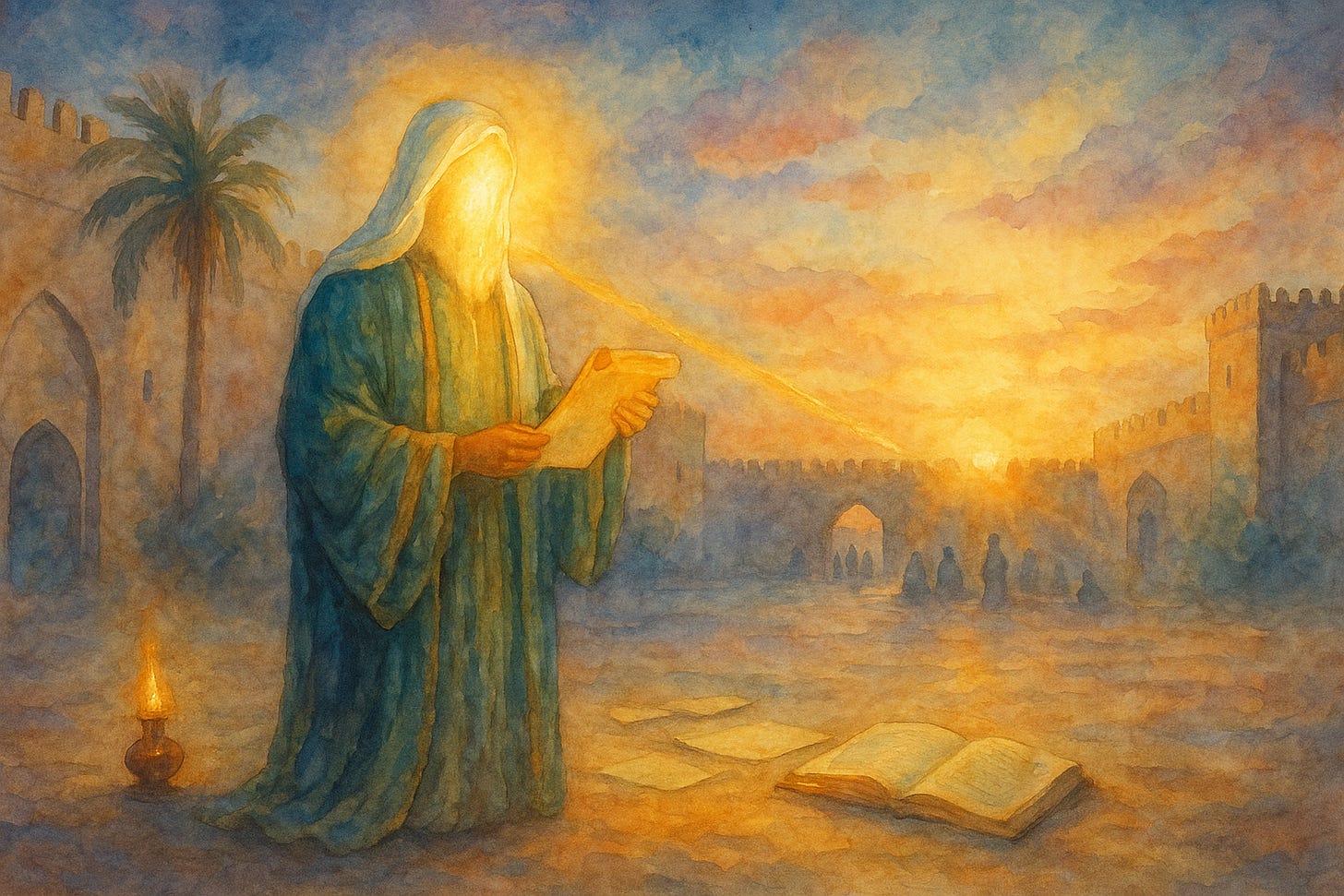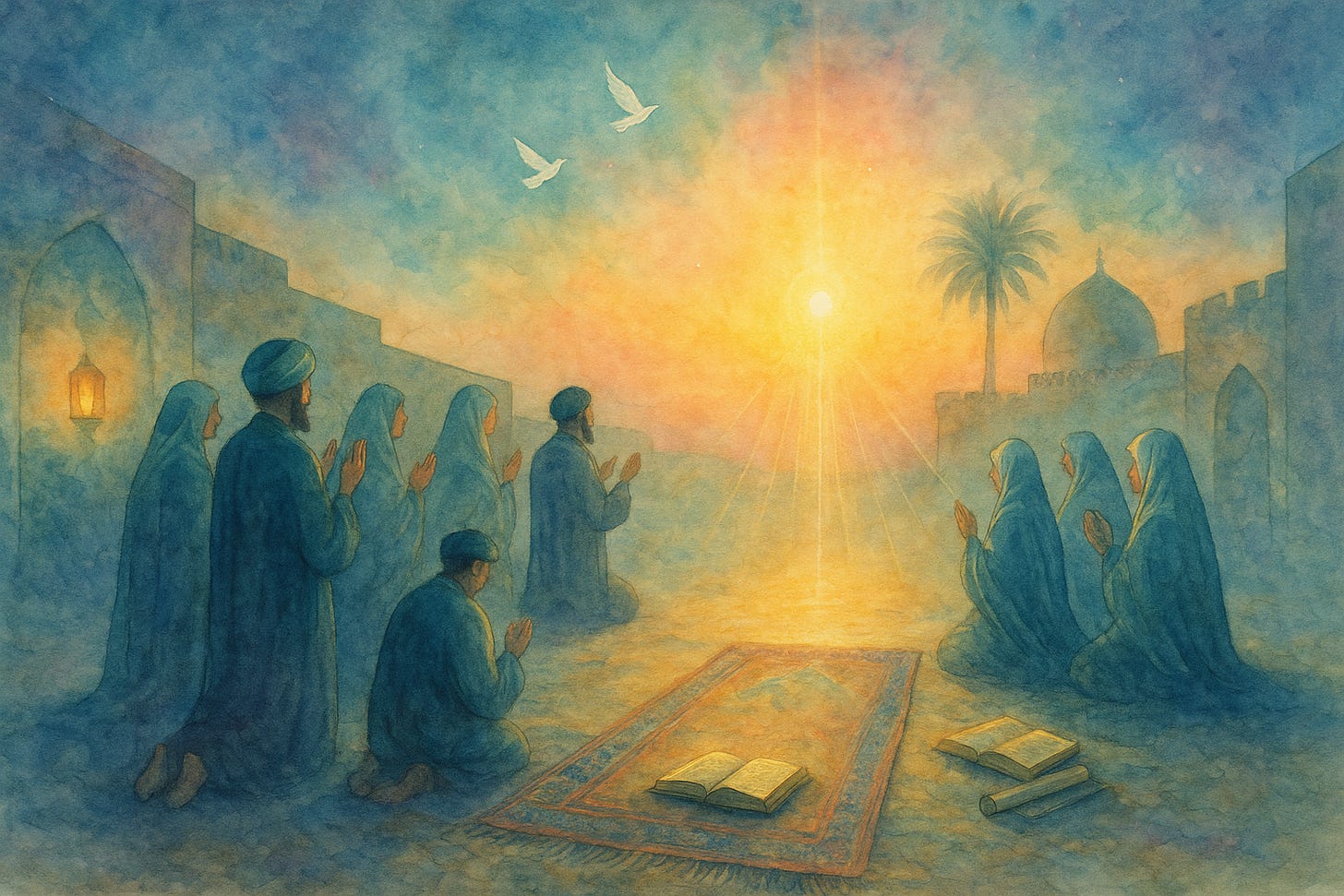[43] Imamah (Leadership) - Imam Hasan al-Askari - Part 1: The Imam of Preparation
A series of discussions on the teachings of Imam Sadiq (sixth Imam of the Muslims), from the book Misbah ash-Sharia (The Lantern of the Path)
In His Name, the Most High
As the sacred torch of Imamate is passed from father to son, our journey follows its light, moving deeper into the garrison-city of Samarra. Our understanding, built session upon session, continues to weave into a single, interconnected tapestry of divine resistance.
Over our last two gatherings, we walked with the tenth Imam, Ali ibn Muhammad al-Hadi. We stood with him in the heart of the military fortress and witnessed an Imam who was imprisoned but not contained. We saw him deliver the Ziyarah al-Jami’ah al-Kabirah, the “Charter of Wilayah,” defining the cosmos while the tyrant defined his physical space. We saw him deploy the Wikala System, a brilliant clandestine network that turned the enemy’s walls into the central node of a global community.
That legacy of theological clarity and practical genius is the essential preface to our session today. For the torch of divine guidance, though passed from a father martyred by poison, is never extinguished. It ignites immediately in his chosen son, who must now bear an even heavier burden.
Today, we turn our hearts to the eleventh Imam, Imam Hasan ibn Ali al-Askari (peace be upon him).
His story is not just a continuation; it is the final, breathless intensification of the Samarra strategy. Where his father, Imam al-Hadi, was “the Light in the Garrison,” Imam al-Askari was “the Prisoner of the Garrison.” His life was one of near-total house arrest, under the most suffocating surveillance imaginable. The regime, now terrified of a prophesied son, watched his every move.
The Imam’s entire life was a sacred act of diversion and protection. His mission was not just to run the network, but to complete the divine plan: to safeguard the secret birth and protect the life of the final Proof of God, the Awaited One, Imam al-Mahdi. This is the story of the guardian who lived under siege, the father who protected the future.
With the epic of Imam al-Hadi fresh in our minds, let us now turn to his son: Imam Hasan al-Askari—the Guardian of the Dawn.
In His most beautiful Name, and with full trust in His support, imploring His assistance and guidance, we proceed…
The previous sessions can be found here:
Video of the Majlis (Sermon/Lecture)
This is the video presentation of this write-up as a Majlis (part of the Truth Promoters Weekly Wednesday Majlis Program)
Audio of the Majlis (Sermon/Lecture)
This is the audio presentation of this write-up as a Majlis (part of the Truth Promoters Weekly Wednesday Majlis Program)
Recap
The Garrison as a School: A Review of the Imamate of al-Hadi
In our last two sessions, we explored the profound legacy of the tenth Imam, Ali al-Hadi. We saw how his life was a masterclass in turning a prison into a pulpit and a weakness into a strength, establishing the foundations for the Age of Occultation.
Our journey covered two main parts:
Part One: The Charter of Wilayah
First, we focused on the theological and moral victories of the Imam.
The Divine Counter-Plot: We traced his forced exile from Madinah to the military fortress of Samarra. We learned how the tyrant al-Mutawakkil’s plot to “cage” the Imam was, in fact, a divine makr (counter-plan/scheme) that forced the Shia to mature and rely on a veiled leadership.
The Charter from the Cage: From within that prison, the Imam delivered his masterpiece, Ziyarah al-Jami’ah al-Kabirah. We explored how this “constitution of Imamology” is not shirk, but the very essence of Tawhid (monotheism/unity of God), defining the Imams as the “locations of the cognition of God.”
Dignified Resistance: We witnessed his supreme moral triumph in the tyrant’s court, where he refused wine and, with a piercing poem on death, shattered the caliph’s arrogance, embodying the Husayni cry: “How far from us is humiliation!”
Part Two: The Clandestine Infrastructure
In our second session, we explored the practical genius of how the Imam led his global community from that prison.
Engineering the Wikala: We analysed the Wikala (Agency) System—a sophisticated, clandestine network of deputies who managed finances (khums, zakat, fidya, kaffarah, donations, etc.), answered legal questions (fiqh), and relayed the Imam’s commands (tawqi’at) across the world.
The Crisis of Amanah: This led us to a critical clarification on the amanah (trust) of this system, demanding that our modern centres operate with the same verifiable ijazah (permission), financial transparency, and accountability that the Imams insisted upon.
Guidance in the Garrison: We saw the Imam’s pastoral side as he turned his own jailers into devotees, and we honoured the station of his noble wife, Sayyedah Hudayth (Sawsan), who was not just a pious woman but a key institutional actor—”The Grandmother as Guardian”—tasked as the executor of the Imam’s will.
Training for Occultation: Finally, we learned that the Imam’s physical veiling by the state was a divine “training ground,” forcing the community to perfect the protocols of authentication, compartmentalisation, and succession that would be necessary to survive the coming Ghaybah (Occultation).
Imam al-Hadi perfected this dual system—a divine charter and a resilient network—and handed it all to his son, who would face the final, most dangerous phase of the mission.
Imamah (Leadership) - Imam Hasan al-Askari: The Imam of Preparation
The Qur’anic Frame
Before we step into the besieged home of Imam Hasan al-Askari, we must first anchor our understanding in the eternal words of the Holy Qur’an.
The Imam’s entire mission—a life lived under guard, dedicated to preparing for an unseen successor—is a profound commentary on three foundational pillars of our faith, all established in God’s Book.
First, the primary condition of the entire era he was inaugurating: Belief in the Unseen (Ghayb).
This is the very first quality God attributes to the pious in the opening of the Qur’an.
الَّذِينَ يُؤْمِنُونَ بِالْغَيْبِ...
“Those who believe in the Unseen...”
— Qur’an, Surah al-Baqarah (the Chapter of the Cow) #2, Verse 3.
This is not a vague or passive belief.
As Allamah Tabatabai explains, this is the very foundation of religious perfection, distinguishing faith from mere sensory perception.
المراد بالغيب ما يقابل الشهادة، وهو ما لا يقع تحت الحواس... فالايمان بالغيب هو أول صفة ممدوحة للمؤمنين في القرآن، وهو أساس كل كمال ديني.
The meaning of al-ghayb is that which is opposite to al-shahadah (the witnessed/seen), and it is that which does not fall under the senses... Therefore, belief in the unseen is the first praised quality of the believers in the Qur’an, and it is the foundation of all religious perfection.
— Allamah Sayyed Muhammad Husayn Tabatabai, Tafsir al-Mizan, Volume 1, Commentary on Surah al-Baqarah, Verse 3.
Imam al-Askari’s life was a masterclass in training his followers for this very belief—to trust in a leadership that, while physically inaccessible, remains ever-present.
Second, the divine promise that this struggle would not be in vain: The Promise of Succession (Istikhlaf).
The Imam’s work was not just about surviving oppression, but about building the community that would one day inherit the earth.
وَعَدَ اللَّهُ الَّذِينَ آمَنُوا مِنكُمْ وَعَمِلُوا الصَّالِحَاتِ لَيَسْتَخْلِفَنَّهُمْ فِي الْأَرْضِ...
God has promised those who believe among you and do righteous deeds that He will surely grant them succession (layastakhlifannahum) in the earth...
— Qur’an, Surah an-Nur (the Chapter of the Light) #24, Verse 55.
This verse is the engine of the Imam’s mission.
His entire life was dedicated to fostering the “righteous deeds” that are the prerequisite for this succession, which would be embodied in his son, Imam al-Mahdi (may our souls be his ransom and may God hasten his return).
He was not just the guardian of a person; he was the guardian of this divine promise.
And third, the irrefutable source of his authority: The Unassailable Nature of Wilayah (Guardianship).
The tyrants believed that by imprisoning the Imam, they could strip him of his power.
They confused leadership with worldly freedom, a mistake the Qur’an had long since corrected.
إِنَّمَا وَلِيُّكُمُ اللَّهُ وَرَسُولُهُ وَالَّذِينَ آمَنُوا الَّذِينَ يُقِيمُونَ الصَّلَاةَ وَيُؤْتُونَ الزَّكَاةَ وَهُمْ رَاكِعُونَ
Your guardian (wali) is only God, His Messenger, and those who believe—those who establish prayer and give zakat while bowing down.
— Qur’an, Surah al-Ma’idah (the Chapter of the Table Spread) #5, Verse 55.
Wilayah is a divine station, not a political office.
It is an authority bestowed by God, not by a caliph. As Ayatullah Jawadi-Amoli explains, this verse proves that Wilayah is a spiritual reality, not a worldly one, and it cannot be “caged.”
ولایت در این آیه به معنای سرپرستی و رهبری معنوی و باطنی است، نه صرفاً یک حکومت ظاهری... این یک مقام الهی است که به اذن خدا، در باطن عالم تصرف دارد.
Wilayah in this verse has the meaning of spiritual and inward guardianship and leadership, not merely an outward government... This is a divine station that, by God’s permission, has authority over the inner reality of the universe.
— Ayatullah Abdullah Jawadi-Amoli, Tafsir Tasnim, Volume 22, Commentary on Surah al-Ma’idah, Verse 55.
Imam al-Askari’s life is the ultimate proof of this Qur’anic fact: his chains did not diminish his Imamate one iota.
With this divine framework established, we can now explore the first theme of his besieged, yet brilliant, leadership.
The Final Phase: Perfecting the Clandestine Network
Imam Hasan al-Askari inherited the “Charter of Wilayah” (Ziyarah al-Jami’ah al-Kabirah) and the “Comprehensive Organisational Endeavour” (the Wikala system) from his father.
But his reality was even more severe.
While Imam al-Hadi was under surveillance in the garrison-city of Samarra, Imam al-Askari lived under what can only be described as total house arrest.
The Abbasid Caliph, al-Mu’tamid, was terrified.
He was not just trying to manage an Imam; he was trying to prevent the birth of the prophesied saviour, Imam al-Mahdi.
The Imam’s home was constantly monitored by spies and soldiers.
His every visitor was logged, his every letter intercepted.
This suffocating pressure forced the Imam to perfect the clandestine system, taking it to its final and most secure phase.
This reality resonates powerfully today.
The resistance movements in Gaza, Lebanon, Yemen, and beyond operate under the most sophisticated surveillance apparatus in human history - satellites that can read license plates from space, drones that circle endlessly, AI systems that analyse every digital communication.
Yet like Imam al-Askari’s network, they continue to coordinate, to strike, to resist.
The Imam proved that no amount of surveillance can stop divine work.
Today’s resistance proves the same truth: you can watch every move of the oppressed, yet still be surprised by their victory.
The tyrants have better technology than al-Mu’tamid ever dreamed of, but the principle remains:
Wilayah cannot be surveilled into submission.
His leadership was almost entirely one of satr (veiling).
His primary mode of communication was no longer in person, but almost exclusively through secret signed letters (tawqi’at) and his most trusted, elite agents.
This is the “Comprehensive Organisational Endeavour” that Imam Khamenei described, now operating under maximum pressure.
این سازماندهی و این تشکیلات گستردهی شیعی در همهی اقطار دنیای اسلام، یکی از شگفتیهای تاریخ زندگی ائمه (ع) است... این یک تشکیلات عظیمی است که با این پنهانکاری، با این رازپوشی، با این همه تلاش, اینها را اداره میکردند.
This organisation and this vast Shia infrastructure in all corners of the Islamic world is one of the marvels of the history of the Imams’ lives... It was a magnificent organisation that they administered with such secrecy, with such confidentiality, with such immense effort.
— Imam Khamenei, Insan-e 250 Saleh (The 250-Year-Old Person), Chapter 18, Section on the Clandestine Organisation
The lynchpin of this entire operation, the direct bridge between the Imam and the world, was his most trusted confidant: Uthman ibn Sa’id al-Amri.
This was a man of supreme piety, intelligence, and trustworthiness, who had faithfully served the Imam’s father, Imam al-Hadi, and was now entrusted with the most dangerous mission.
To protect his true identity, Uthman ibn Sa’id operated under a brilliant disguise: he was a humble ghee (cooking oil) seller (al-samman).
He would fill large jars with ghee, but at the bottom, he would hide the letters and Khums funds from the Shia.
He would then enter and leave the Imam’s besieged house under the guise of delivering food, right under the noses of the Caliph’s guards.
This was not merely clever tradecraft - it was sacred symbolism.
Just as ghee nourishes the body, the hidden letters nourished souls. Just as oil lights lamps, the concealed khums illuminated the community.
The Imam transformed even the disguise into a teaching.
This was not just a clever trick; it was the sacred, high-stakes work of building the “conscious base” that the great martyr Ayatullah Sayyed Muhammad Baqir al-Sadr spoke of.
كان الأئمة (عليهم السلام)... يمارسون بناء هذه القاعدة الواعية... من خلال شبكة من الوكلاء والارتباطات... وهذا البناء هو الذي شكّل الحصانة الحقيقية للإسلام والمجتمع.
The Imams (peace be upon them)... were building this conscious base... through a network of agents and communications... and this structure is what formed the true immunity for Islam and the community.
— Ayatullah Sayyed Muhammad Baqir al-Sadr, Ahl al-Bayt: Tanawwu’ Adwar wa Wahdat Hadaf (Ahl al-Bayt: Diversity of Roles and Unity of Purpose), Page 72.
Imam al-Askari’s final and most important act was to formalise this system for the era after him.
He made it clear that Uthman ibn Sa’id was not just his personal agent, but the designated link to his successor.
Shaykh al-Tusi records the moment Imam al-Askari presented his son, the young Imam al-Mahdi (may our souls be his ransom, and may God hasten his return), to his most trusted deputies:
فَقَالَ [الإمام العسكري]: ...هَذَا إِمَامُكُمْ مِنْ بَعْدِي وَ خَلِيفَتِي عَلَيْكُمْ، أَطِيعُوهُ وَ لَا تَتَفَرَّقُوا مِنْ بَعْدِي فِي أَدْيَانِكُمْ فَتَهْلِكُوا...
He [Imam al-Askari] said: “...This is your Imam after me, and my successor over you. Obey him, and do not disperse after me in your religion, or you will be destroyed...”
— Shaykh al-Tusi, Kitab al-Ghaybah (The Book of Occultation), Page 217.
By appointing Uthman ibn Sa’id—the man who had perfected the art of clandestine communication—as the chief deputy, Imam al-Askari ensured a seamless transition.
When the Imam was martyred, Uthman ibn Sa’id al-Amri did not have to start a new system; he simply continued his work.
He became the First of the Four Special Deputies (al-Nawwab al-Arba’a) of the Minor Occultation.
This seamless transition - from serving the visible Imam to serving the hidden one without missing a single letter or payment - proves this was not human improvisation but divine orchestration.
The system didn’t scramble or collapse when the Imam was martyred; it simply continued, like a river that goes underground but never stops flowing.
This perfect continuity is itself a miracle, a proof that the whole structure was engineered by divine wisdom, not mortal planning.
This was not an accident; it was a perfect, divinely guided plan.
Call to Clarify: The Protocol of Trust: Our Modern Wikala
The legacy of this final, perfected Wikala is the system of Wilayat al-Faqih and the Marja’iyyah that we live under today.
The amanah (trust) is the same, and the rules are the same.
This is not a historical relic; it is our active duty.
This means we must, with even more vigour, adhere to the protocols of trust that Imam al-Askari finalised:
Authentication: We must demand verifiable ijazah (permission) from any agent, as the Imam’s followers had to authenticate his tawqi’at (letters).
Accountability: We must reject any agent who displays opulence or corruption, just as the Imams would denounce false agents.
Transparency: We must insist on a clear, transparent, and accountable system for Khums (and other religious dues), as this is the sacred right of the Imam and the Ummah, not the private fund of an individual.
Failing in this is not just a financial error; it is a betrayal of the very system Imam al-Askari dedicated his besieged life to building for our sake.
It is a failure to be “ready” for the Imam whose return we claim to await.
The Garrison as a Blueprint: Refuting the “Lesser Imams” Fallacy
Now we must address a dangerous, satanic whisper that has infected the subconscious of many.
It is the tendency to view the later Imams—those who lived after Karbala, especially the three Imams of Samarra—as somehow “lesser” or “smaller.”
We see them as passive, quiet, and imprisoned, lacking the grand, public victories of their forefathers.
This is a catastrophic misunderstanding.
For us, the people living in the Age of Occultation (Ghaybah), the lives of these three Imams—Imam al-Jawad, Imam al-Hadi, and Imam al-Askari—are not a minor chapter.
They are the most important chapter.
Their lives are not an epilogue; they are the operating manual for our survival.
Our collective failure to thrive in the Ghaybah is a direct result of our failure to study their blueprint.
Their entire lives were a divine “training ground” to teach us how to live as a community of Wilayah when the Imam is physically veiled.
What is this blueprint?
It consists of two primary commands:
Sincere, loophole-free submission to the Wikala (Agency) system, which today is represented by the Maraji’ (Grand Jurists) and the Wali al-Faqih (Guardian-Jurist).
The sacred duty and moral courage to hold that very system accountable, distinguishing true scholars from corrupt ones.
The Litmus Test: Who Is a True Wakil?
The Imams did not leave us blind.
They gave us a precise litmus test for who to follow.
This is not a matter of opinion; it is a matter of fiqh.
The most powerful definition comes from the Imam of our session himself, Imam Hasan al-Askari (peace be upon him).
When asked who the common people should follow, he laid down iron-clad, non-negotiable conditions:
قَالَ (ع): ...فَأَمَّا مَنْ كَانَ مِنَ الْفُقَهَاءِ صَائِناً لِنَفْسِهِ، حَافِظاً لِدِينِهِ، مُخَالِفاً عَلَى هَوَاهُ، مُطِيعاً لِأَمْرِ مَوْلَاهُ، فَلِلْعَوَامِّ أَنْ يُقَلِّدُوهُ.
He (peace be upon him) said: “...But as for the one from among the jurists (fuqaha’) who is a guardian of his self (sā’inan li-nafsih), a protector of his deen (religion), an opposer of his vain desires, and obedient to the command of his Master—then it is upon the common people (al-’awam) to follow him (yuqalliduh).”
— Imam Hasan al-Askari, cited in Al-Tabrisi, Al-Ihtijaj, Volume 2, Page 458.
This is our standard.
A scholar — and this doesn’t just apply to the senior scholars, but to every scholar, regardless of level — who is a slave to his desires, a lover of dunya (the world), or a protector of his own ego is, by the Imam’s own definition, disqualified.
The Legal Mechanism: The Fall of ‘Adalah (Justice)
This is not just a moral guideline; it is a legal ruling.
The primary condition for any religious authority—from a Marja’ to a local prayer leader—is ‘Adalah (Justice).
What is ‘Adalah?
It is not a vague sense of being “nice.”
It is a precise legal status.
مسألة ١٦: العدالة... هي الاستقامة على جادة الشريعة المقدسة... وتتحقق بترك الكبائر، وعدم الإصرار على الصغائر.
Issue 16: ‘Adalah (Justice)... is uprightness on the path of the sacred Shari’ah... It is achieved by abandoning major sins, and not persisting in minor sins.
— Ayatullah Sayyed Ali al-Sistani, Minhaj al-Salihin, Volume 1, Issue #16.
Is financial corruption a major sin?
Yes.
Is arrogance a major sin?
Yes.
Is living in opulence from the Imam’s funds while the poor starve a major sin?
Yes.
Is providing direct or indirect support to those tyrants and oppressors engaged in crimes against humanity and genocide a major sin?
Yes.
Is lying to the community a major sin?
Yes.
A corrupt scholar is, by fiqhi definition, not ‘adil. And if he is not ‘adil, it is haram (forbidden) to follow him.
His authority is legally void.
مسألة ١: يجب على كل مكلف... أن يكون في جميع عباداته... مقلِّداً، و يجب أن يكون المقلَّد: مجتهداً، بالغاً، عاقلاً،... عادلاً.
Issue 1: It is obligatory (wajib) on every obligated person... that in all his acts of worship... he be a muqallid (follower), and it is obligatory that the one being followed (muqallad) be: a mujtahid, adult, sane, ... ‘adil (Just).
— Ayatullah Sayyed Ali al-Sistani, Minhaj al-Salihin, Volume 1, Issue #1.
The Moral Duty: Confronting the “Corrupt ‘Alim“
Therefore, to “look away” when we see corruption is not piety; it is a failure in our fiqhi duty.
We are commanded to identify and reject the false physician.
Imam Khomeini saved his most potent fury not for outside enemies, but for the “corrupt ‘alim“ (scholar) within.
آن عالِمی که در فکر حفظ مسند خود است... نمیتواند حافظ اسلام باشد. آن عالِمی که دنبال دنیا و تجملات است، فاسد است و جامعه را به فساد میکشاند.
That scholar who is only thinking of protecting his own position... cannot be a guardian of Islam. That scholar who chases the dunya (world) and its luxuries is corrupt (fāsid) and drags society into corruption (fasād).
— Imam Khomeini, Sahifeh-ye Imam, Volume 15, Page 310.
But what is the motive for this accountability?
Here, we must be crystal clear, for this is the very point that Satan uses to silence us with accusations of “disrespect.”
This is not a political witch hunt or a chance to tear down our leaders.
It is, in its essence, an act of the most profound and desperate love.
Let us be clear: a so-called scholar who takes khums and lives in luxury while the orphans of Gaza starve is not just failing in charity - he is stealing from the Imam himself.
This is not a minor sin that affects his ‘adalah; this is khayanah (treachery) against the Hidden Imam whose funds these are.
A believer is the brother of a believer.
Imam al-Sadiq defined this sacred bond:
اَلْمُؤْمِنُ أَخُو الْمُؤْمِنِ، عَيْنُهُ وَ دَلِيلُهُ، لَا يَخُونُهُ وَ لَا يَظْلِمُهُ وَ لَا يَغُشُّهُ وَ لَا يَعِدُهُ عِدَةً فَيُخْلِفَهُ.
A believer is the brother of a believer, his eye and his guide. He does not betray him, he does not oppress him, he does not cheat him, and he does not make him a promise that he then breaks.
— Al-Kulayni, Al-Kafi, Volume 2, Kitab al-Iman wa al-Kufr, Hadeeth #3.
Our primary duty under Amr bil Ma’rouf wa Nahi anil Munkar (Enjoining the Good and Forbidding the Evil) is to be that guide and that eye for our brother.
Just as God does not want His servants to enter Hell, we do not want our brother—scholar or not—to destroy himself in this world and the next.
Would you look away if you saw your brother, blinded, about to be hit by a car?
Would you remain silent if you saw him walking into a burning building?
How, then, can a believer remain silent when he sees his brother—be he a layperson or a robed scholar—walking into the open arms of Satan?
This “confrontation” is not an attack.
It is an intervention.
It is a loving, desperate attempt to grab our brother from the treachery of Satan and pull him back into the safe embrace of the Godly.
It must be done with respect and dignity, but with the unshakeable firmness of one who is trying to save a soul.
The Qur’anic Test: How to Recognize Truth and Falsehood
God Himself gave us the tools to discern.
We are not meant to be blind.
On Recognising the Righteous
How do we know a true scholar?
It is not by the size of his turban or the grandeur of his title, but by an inner light that becomes visible.
...سِيمَاهُمْ فِي وُجُوهِهِم مِّنْ أَثَرِ السُّجُودِ...
...Their mark is on their faces from the trace of prostration...
— Qur’an, Surah al-Fath (the Chapter of the Victory) #48, Verse 29.
Allamah Tabatabai, in Tafsir al-Mizan, clarifies that this “mark” is not a physical callous, but the outward manifestation of their inward spiritual state—a light of humility and tranquility that radiates from the soul.
وَالْمُرَادُ بِالسِّيمَا الْعَلَامَةُ الَّتِي تُعْرَفُ بِهَا الشَّيْءُ... وَالظَّاهِرُ أَنَّ الْمُرَادَ بِهَا هِيَ الصَّفْرَةُ وَالْخُشُوعُ وَسِمَةُ التَّوَاضُعِ الَّتِي تَعْلُو وُجُوهَهُمْ لِكَثْرَةِ عِبَادَتِهِمْ وَسَهَرِهِمْ بِاللَّيْلِ، وَلَيْسَ الْأَثَرَ الظَّاهِرَ فِي الْجَبْهَةِ...
The meaning of sīmā is the ‘mark’ by which a thing is known... and what is apparent is that the meaning here is the paleness, the khushū’ (awe/humility), and the characteristic of humility that overcomes their faces due to the abundance of their worship and their vigils in the night, and it is not the outward mark on the forehead...
— Allamah Sayyed Muhammad Husayn Tabatabai, Tafsir al-Mizan, Volume 18, Commentary on Surah al-Fath, Verse 29.
On Recognising the Hypocrites
Conversely, God gives us a tool to detect the frauds.
He says to the Prophet (peace and blessings be upon him and his family) about the hypocrites:
...وَلَتَعْرِفَنَّهُمْ فِي لَحْنِ الْقَوْلِ...
...And you would surely know them by the lahn (tone/implication) of their speech...
— Qur’an, Surah Muhammad (the Chapter of the Prophet Muhammad) #47, Verse 30.
As Ayatullah Jawadi-Amoli explains in Tafsir Tasnim, this lahn al-qawl (”tone of speech”) is the “language of hypocrisy” itself, which a true believer can intuitively recognise.
لحن قول، همان آهنگ کلام و شیوه سخن گفتن است. منافقان هر چند بکوشند که نفاق خود را پنهان کنند، اما از آنجا که گفتارشان از دلی بیمار برمیخیزد، مؤمنان تیزهوش که دلی سالم دارند، میتوانند بیماری آنان را از آهنگ کلامشان تشخیص دهند. کلماتشان بوی نفاق میدهد؛ بوی دنیاپرستی، تملق، و کینه نسبت به مؤمنان.
Lahn-e qawl is the very melody of speech and the method of talking. As much as the hypocrites try to hide their hypocrisy, because their speech arises from a diseased heart, the sharp-witted believers who possess a sound heart are able to diagnose their sickness from the melody of their speech. Their words smell of hypocrisy; they smell of worldliness, flattery, and malice towards the believers.
— Ayatullah Abdullah Jawadi-Amoli, Tafsir Tasnim, Volume 14, Commentary on Surah Muhammad, Verse 30.
The Caveat: The Mirror of the Self
But here, we must pause.
Before we use this divine test as a sword to strike down others, we must first hold it up as a mirror to ourselves.
Before we accuse a scholar of being in love with the dunya, we must first ask: Are we?
Before we point out the hypocrisy in another’s speech, we must first ask: Is our own speech pure?
This sacred standard is a tool for purification, not a weapon for arrogance.
Call to Clarify: The Occultation is a Test of Followership
The blueprint of the Samarra Imams is clear.
We live in the Ghaybah, and our test is one of true followership.
This demands two simultaneous duties:
Sincere Submission: We must follow our righteous Maraji’ and the Wali al-Faqih with sincerity, not as “loophole-shoppers” looking for the easy way out. We must stop the disgusting practice of asking the same question to five different scholars, hoping for the answer our hawa (desire) wants to hear. This is the sickness of the Children of Israel, and it has no place amongst the followers of the Imam.
Courageous Accountability: We must have the moral courage to hold our religious institutions accountable. When we see corruption, opacity, or opulence, we must—with the utmost adab (respect) but with unshakable firmness—demand accountability. This is not “disrespect”; it is our sacred duty to protect the deen and to fulfil the amanah (trust) of Imam al-Mahdi (may our souls be his ransom, and may God hasten his return).
This is the true lesson of the garrison: to be a community that is disciplined, discerning, and absolutely loyal to the pure standards of the Imamate, ready for the return of its final heir.
A Light from the Cell: The Jihad of Knowledge and Character
The caliph’s strategy was simple: imprison the Imam, cut off his communication, and wait for his influence to die.
What the caliph failed to understand is that a divine light cannot be contained by mortal walls.
Imam Hasan al-Askari demonstrates that Wilayah (Guardianship) is a spiritual reality, not a political one, and it cannot be “caged.”
From within his besieged home, the Imam launched a two-pronged jihad, proving that guidance can transcend any prison.
The Jihad of Knowledge: A Voice That Outlasts Walls
First, the Imam engaged in a jihad of knowledge.
The state could stop him from sitting in a mosque, but they could not stop him from thinking, writing, or dictating.
His most powerful intellectual legacy is the profound tafsir (exegesis) attributed to him.
A prime example is his lengthy and beautiful commentary on a single phrase: Bismillah al-Rahman al-Rahim (In the Name of God, the Most Merciful, the Most Compassionate).
عَنْ أَبِي مُحَمَّدٍ الْحَسَنِ الْعَسْكَرِيِّ (ع) فِي تَفْسِيرِ “بِسْمِ اللَّهِ الرَّحْمَٰنِ الرَّحِيمِ”: اللَّهُ هُوَ الَّذِي يَتَأَلَّهُ إِلَيْهِ عِنْدَ الْحَوَائِجِ وَالشَّدَائِدِ كُلُّ مَخْلُوقٍ...
It is narrated from Abu Muhammad al-Hasan al-Askari (peace be upon him) in his tafsir of “Bismillah al-Rahman al-Rahim”: “...God is the One to whom every creature turns in longing (yata’allahu ilayhi) at the time of needs and calamities...“
— Imam Hasan al-Askari, cited in Allamah al-Majlisi, Bihar al-Anwar, Volume 90, Page 229.
Consider the divine irony: the tyrants confined his body to the smallest cell, yet from that cell emerged a commentary on just four words - Bismillah al-Rahman al-Rahim - that contains oceans of meaning.
Even the briefest phrase becomes infinite when touched by an Imam’s knowledge.
The prison walls could contain his body but not his light - a single divine phrase in his hands expanded to fill libraries, while his captors’ vast palaces contained nothing but spiritual emptiness.
From his cell, the Imam was teaching pure tawhid, explaining that the very name of God is a declaration of Him being the ultimate refuge.
Furthermore, he continued to manage his global network through powerful letters (tawqi’at) to his deputies in distant lands.
He sent crucial instructions, settled complex theological disputes, and provided guidance to communities in places like Qom and Nishapur, all from his prison.
These letters, preserved in our books of hadith, are proof of a leader who was physically captive but globally active.
The Jihad of Character: The Awe of the Jailer
The Imam’s second weapon was his character.
The state could assign its most brutal guards to watch him, but it could not insulate those guards from the sheer spiritual gravity of his akhlaq (ethics).
The historical chronicles are filled with astonishing reports of the Imam’s jailers being completely undone by his presence.
Shaykh al-Mufid narrates that the Abbasids handed Imam al-Askari over to one of their most notoriously cruel and anti-Shia officers, Salih ibn Wasif.
The Caliph’s men instructed the jailer to be merciless.
فَكَانَ صَالِحٌ قَدْ ضَيَّقَ عَلَيْهِ وَآذَاهُ، فَمَا أَقَامَ عِنْدَهُ إِلَّا أَيَّاماً يَسِيرَةً حَتَّى صَارَ مِنْ أَخْيَرِ النَّاسِ فِيهِ بَصِيرَةً، وَأَحْسَنِهِمْ قَوْلًا فِيهِ، وَكَانَ لَا يَزَالُ مُقِيمًا عَلَى الصَّوْمِ بِالنَّهَارِ وَالصَّلَاةِ بِاللَّيْلِ.
Salih had constricted [the Imam] and harmed him. But he had not been with him except for a few short days, when [Salih] became one of the best of people in his insight (into the Imam’s station), and the best of them in his speech about him. And [the Imam] was in a constant state of fasting by day and praying by night.
— Shaykh al-Mufid, Kitab al-Irshad, Volume 2, Page 324.
In another incident, the Imam was handed over to a cruel jailer named Nahir.
When the man’s own wife saw the Imam’s state of constant, dignified worship, she warned her husband.
This is the moment, as recorded in classical sources, that led to the ultimate test:
رُوِيَ أَنَّ الْإِمَامَ (ع) سُلِّمَ إِلَى نَحْرِيرٍ الْخَادِمِ، وَ كَانَ يُضَيِّقُ عَلَيْهِ وَ يُؤْذِيهِ. فَقَالَتْ لَهُ امْرَأَتُهُ: وَيْلَكَ! اتَّقِ اللَّهَ، فَإِنَّكَ لَا تَدْرِي مَنْ فِي مَنْزِلِكَ. وَ ذَكَرَتْ لَهُ صَلَاحَهُ وَ عِبَادَتَهُ وَ قَالَتْ: إِنِّي أَخَافُ عَلَيْكَ مِنْهُ. فَقَالَ: لَأَرْمِيَنَّهُ بَيْنَ السِّبَاعِ. ثُمَّ اسْتَأْذَنَ الْخَلِيفَةَ فِي ذَلِكَ، فَأَذِنَ لَهُ. فَأَلْقَاهُ إِلَيْهَا، فَلَمْ تَشُكَّ النَّاسُ فِي أَكْلِهَا لَهُ. فَنَظَرُوا إِلَى الْمَوْضِعِ لِيَعْرِفُوا الْحَالَ، فَوَجَدُوهُ (ع) قَائِماً يُصَلِّي وَهِيَ حَوْلَهُ مُطْرِقَةٌ.
It is narrated that the Imam (peace be upon him) was handed over to Nahir al-Khadim (the servant/jailer), who would constrict him and abuse him. His wife said to him: “Woe to you! Fear God! You do not know who is in your house.” And she described to him [the Imam’s] righteousness and worship, and said: “Indeed, I fear for you on his account.” He (the jailer) replied: “I will surely throw him between the wild beasts (al-siba’).” He then sought permission from the Caliph for this, and he was permitted.
So he threw him (the Imam) to them (the lions), and the people did not doubt that they would devour him. They then looked upon the scene to know his condition, and they found him (peace be upon him) standing in prayer, while they (the lions) were around him, submissive.
— Allamah al-Majlisi, Bihar al-Anwar, Volume 50, Page 308, (citing earlier classical sources like Al-Kharaij wa al-Jara’ih).
This is the ultimate proof of Wilayah.
The tyrant, in his arrogance, thought he was unleashing a base power, but he only succeeded in revealing a higher one.
The wild beasts, the very symbols of worldly terror, recognised their Lord’s Wali (friend) and were humbled.
The lions had more spiritual insight (ma’rifah) than the Caliph.
Today, we see this same inversion - the resistance fighters in Gaza, surrounded by the world’s most sophisticated killing machines, display more humanity than their oppressors.
The ‘civilised’ powers, like that Caliph, fail to recognise the divine authority that even wild beasts could see.
The Imam standing calm among lions while his captors trembled mirrors another truth: those who face American-made F-35s with faith show more composure than pilots dropping bombs from safety.
The divine formula remains unchanged - those closest to danger often display the most dignity, while those dealing death from distance reveal their cowardice.
The Imam had no army, no worldly power, and no freedom.
Yet his very character, his spiritual gravity, was a form of power so profound that it tamed the untameable and terrified his enemies.
This is the very logic of the resistance.
It is not about thrones or palaces.
As the martyred Sayyed Hassan Nasrallah has often reminded us, the true power of this school is not in worldly trappings, but in its moral and spiritual foundation.
إنَّ قُوَّتَنَا لَيْسَتْ فِي عَدَدِنَا أَوْ سِلَاحِنَا فَقَطْ، بَلْ فِي إِيمَانِنَا وَفِي صِدْقِ قَضِيَّتِنَا وَفِي أَخْلَاقِنَا الَّتِي نَسْتَمِدُّهَا مِنْ أَئِمَّتِنَا.
Our strength is not just in our numbers or our weapons, but in our faith, the truthfulness of our cause, and our ethics, which we draw from our Imams.
— Sayyed Hassan Nasrallah, from various speeches on the ethics of resistance.
Call to Clarify: The Unseen is Not the Absent
This brings us to one of the most vital theological conclusions of our entire series.
Imam Hasan al-Askari’s life is the perfect model for the Ghaybah.
He was physically “veiled” by the walls of Samarra.
The vast majority of his Ummah never saw his face.
They communicated with him only through his wukala’ (agents) and his tawqi’at (letters).
Does that mean he was “absent”?
No.
He was veiled, but fully present.
He was guiding his Ummah, answering their questions, solving their problems, and protecting them.
This is the final lesson he prepared for us.
Our belief in the “unseen” Imam al-Mahdi (may our souls be his ransom, and may God hasten his return) is not a belief in an “absent” Imam.
It is a belief in an Imam who is veiled, just as his father was, but who is just as present, just as aware, and just as active in guiding the affairs of his Ummah.
Imam al-Askari’s life is the irrefutable proof that a divine guide does not need to be visible to be the leader.
Conclusion
So concludes the first part of our journey with the eleventh Imam, Imam Hasan al-Askari.
We have seen him as the Guardian of the Dawn, a leader operating under the most suffocating surveillance in the history of the Imamate.
His life was not one of public speeches, but of clandestine action and profound spiritual resistance.
We have seen:
The Final Phase of the Network: How he perfected the Wikala system, managing a global community through secret letters (tawqi’at) and trusting agents like Uthman ibn Sa’id, who would become the direct bridge to the Minor Occultation.
The Garrison as a Blueprint: We have confronted the fallacy of the “lesser Imams” and established that his life is the primary manual for our own age. His legacy commands us to have sincere, loophole-free submission to our Maraji’ while also having the courage to hold corrupt religious figures accountable.
A Light from the Cell: We saw how his divine knowledge, in the form of his Tafsir and letters, and his divine character (akhlaq), which converted his own jailers, proved that Wilayah is a spiritual reality that no prison can contain.
His entire mission, as we’ve seen tonight, was one of preparation. He was the ultimate guardian, building the systems, training the Ummah, and cultivating the mindset needed to survive the Ghaybah.
But all of this preparation—the secret network, the veiled guidance, the fortress of Samarra—was to protect one, single, cosmic secret.
His final and most critical mission was not just to prepare the Ummah for the Occultation, but to safeguard the very birth of the Imam who would enter that Occultation.
In our next session, God willing, we will explore this final, sacred act: the story of the secret birth of the twelfth Imam, al-Hujjah ibn al-Hasan, Imam al-Mahdi (may our souls be his ransom).
We will discuss the profound story of his noble mother, Sayyedah Narjis, and, in doing so, confront the satanic disease of racism.
And we will learn the covenant he left for us, the Ziyarah Aal-e-Yasin, our direct line of communication to the Imam of our Age.
A Supplication-Eulogy for Imam Hasan al-Askari
The Guardian of the Dawn
In the Name of God, the Most Gracious, the Most Merciful.
O God, send Your blessings upon Muhammad and the family of Muhammad.
Send peace upon the eleventh star in the constellation of Your guidance,
the Imam of Preparation,
the Guardian of the Dawn,
Imam Hasan ibn Ali al-Askari.O Lord,
we send salutations upon the Imam in the garrison,
the prisoner who was freer than his jailers.We thank You for his life,
a life lived under the shadow of the sword,
yet dedicated to building a future for the faithful.We thank You for the blueprint he left us.
We thank You for his Wikala system,
the threads of light he wove across the world from a darkened room.We thank You for his Tafsir,
the rivers of knowledge that flowed from a sealed spring.And we thank You for his Akhlaq (ethics),
the scent of heaven that captivated the brutes assigned to guard him,
proving that Your Wilayah is a power that tames lions and softens hearts of stone.O Lord,
by the sanctity of Imam al-Askari,
who lived veiled by the tyrant’s walls,
forgive us.
For we live in the era he prepared us for,
yet we have failed to learn his lessons.We are the ones who fail to see the “unseen is not the absent.”
We are the ones who look for loopholes rather than submitting to your deputies.
We are the ones who remain silent in the face of corruption,
failing to be “guardians of the deen.”Protect us,
O Lord, from corrupt scholars who would mislead us in Your Hidden Imam’s name,
those who steal his funds and claim his authority while serving only their desires.O God,
just as he prepared his Ummah for the Ghaybah,
we beg You to prepare us for the zuhur (reappearance).Make us a community worthy of his son.
Make us a community that is accountable,
transparent,
and sincere—
a community that has fulfilled the covenant so that our meeting with him is not delayed.We turn to You,
O God, through the Imam who lived to protect Your final Proof.
Grant us the grace to be true servants of that Proof,
Imam al-Mahdi (may our souls be his ransom).Let this pledge be a fire for justice.
Let it be our strength to stand with Your oppressed servants in Gaza and all of Palestine.
O Lord,
accept from us this small remembrance.
Make us a people who are truly “prepared.”
Make us the ones who, when our Imam calls,
we do not hesitate.
And join us with those who lived and died in the garrison of Samarra,
loyal to the very end.Amen, O Lord Sustainer of the Universes.
Amen, O Most Merciful of the Merciful.
And from Him alone is all ability and He has authority over all things.


